Obtain comprehensive but individualized training in a supportive environment as a fellow in the UNM Division of Nephrology
 505-272-0407
505-272-0407
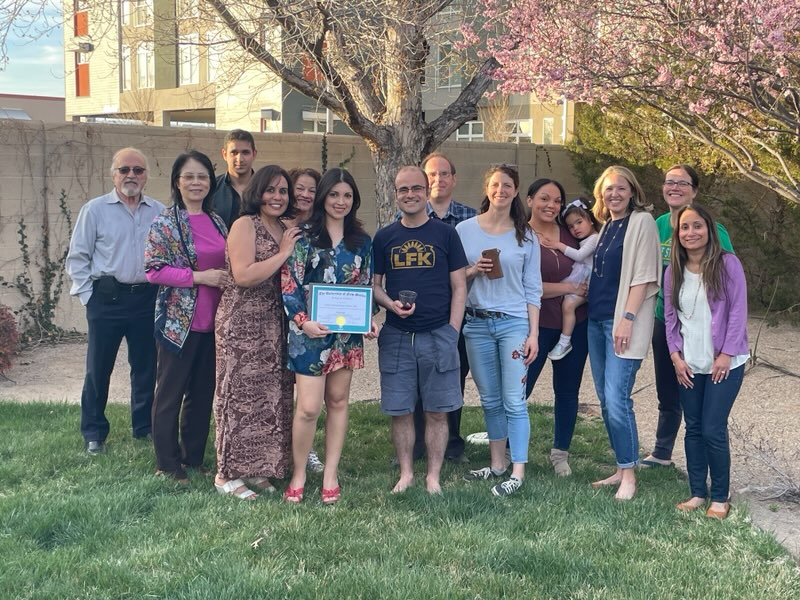
The Nephrology Fellowship Program within UNM's Department of Internal Medicine (DOIM) was established in 1980. We strive to provide a comprehensive foundation in nephrology within a supportive educational environment, allowing graduates to pursue productive careers in academic medicine -- as clinician-educators, physician-scientists, or public health experts -- or in private practice or industry.
The training program is a two-year clinical fellowship centered at UNM Hospital (UNMH), a busy 556-bed tertiary referral center serving the racially and culturally diverse population of New Mexico. The Division of Nephrology has world-renowned physician scientists and skilled clinician-educators providing cutting-edge kidney care to a population of patients with a high burden of kidney disease. Fellows gain a wealth of experience in renal consultative services including acute kidney injury (AKI), glomerular disease, chronic kidney disease (CKD), and end-stage kidney disease (ESKD). We provide training in acute and chronic hemodialysis, continuous renal replacement therapy (CRRT), kidney transplantation, kidney donor evaluation, native and transplant kidney biopsies, and temporary dialysis catheter placement. Our division cares for a large ESKD population treated with both hemodialysis and home peritoneal dialysis in our outpatient chronic dialysis facilities.
We also offer several subspecialty tracks. Fellows in the three-year Interventional Nephrology track receive procedural training under the supervision of ASDIN- (American Society of Diagnostic and Interventional Nephrology-) accredited faculty to become eligible for ASDIN certification. The Nephrology-Critical Care track consists of combined training in clinical nephrology and intensive care medicine within the Division of Nephrology and the Division of Pulmonary, Critical Care, and Sleep Medicine, while our Clinical Informatics Pathway offers combined training with our Translational Informatics Division.
Though the tremendous depth and breadth of kidney disease encountered at UNMH and the Albuquerque VA remain at the heart of the training program, our fellowship has evolved significantly over the last few years by introducing a series of thoughtful innovations designed to improve the educational experience and overall wellbeing of our fellows. Recently implemented measures designed specifically to increase fellow wellbeing include:
We are a family-friendly program and many of our fellows have taken the opportunity to start a family while completing their training at UNM. We believe that ensuring you are a happy, healthy individual outside our program makes you a stronger physician.
New Mexico offers beautiful scenery and access to all kinds of outdoor activities all year. Skiing, hiking, music, theater, museums, national parks, and culture are everywhere, including right here in Albuquerque.
Kidney disease disproportionally affects minorities and patients of lower socioeconomic status. New Mexico is a majority-minority state and one third of the state's population is below the poverty line, giving trainees extensive experience in navigating intercultural communication with patients. In addition, since 1952 UNMH has served as the primary referral center for the Native American healthcare network within the state and for the Navajo Nation of Arizona, New Mexico, and Utah. UNM offers unique opportunities for the training of fellows interested in providing healthcare to ethnically diverse, rural, and socioeconomically challenged populations.
The nephrology division of UNM is dedicated to the care of underserved patients with kidney disease, both in our day-to-day clinical operations and our research mission. The Center for Healthcare Equity in Kidney Disease (CHEK-D) is a research program within the division specifically dedicated to reducing or eliminating disparities in kidney disease care.
The promotion of diversity among our trainees and faculty is a priority for our fellowship program. We value diversity in culture, race, religion, age, sexual orientation, and gender identity and are committed to recruiting and training fellows from groups underrepresented in medicine. The program encourages trainees from all backgrounds to apply and performs holistic reviews of applications. To better serve our population, we also prioritize the recruitment of speakers of Spanish, Navajo, and Vietnamese. Fellows have access to resources provided by Offices for Diversity, Equity and Inclusion of both the UNM Health Sciences Center and the School of Medicine (SOM).
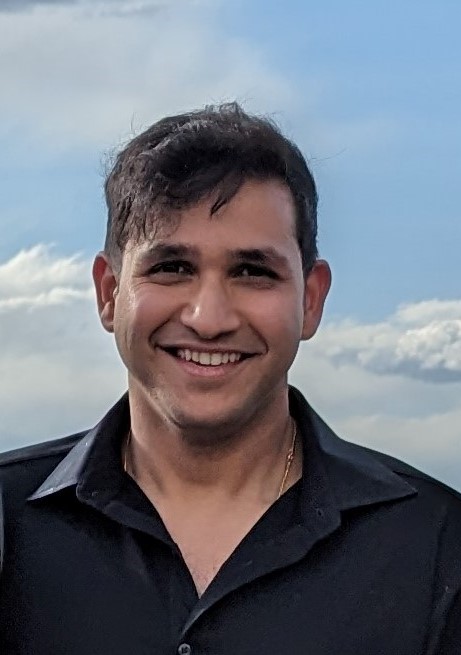
I got so much more than what I bargained for. An excellent mix of brilliant upcoming faculty in the field teaching alongside some of the most well-known minds of nephrology. All of whom are thoughtful, kind, and welcoming. A comprehensive training in all aspects of nephrology combined with individual faculty expertise made it an excellent training program for me. Succinctly put, I am extremely proud to be an alumnus of the program.
All applicantions are through the Electronic Residency Application Service (ERAS). A completed application includes:
Invitations for interviews are sent by e-mail. In accordance with AAMC guidelines, all interviews will be virtual only.
International medical graduates (IMGs) should refer to the tab "International Medical Graduates" below for additional details.
The fellowship program is designed to be flexible, equipping you for a career in clinical nephrology, while also allowing fellows interested in academic medicine to pursue opportunities for teaching or research. The first year emphasizes the acquisition of basic skills in inpatient clinical nephrology, including expertise in the management of AKI, electrolyte and acid-base disorders, renal transplant, acute hemodialysis, and CRRT. First-year fellows also learn outpatient kidney disease management in a once weekly half-day continuity clinic. Along with further clinical experience in inpatient and outpatient nephrology, the second year provides additional focus on outpatient dialysis (both hemodialysis and peritoneal dialysis), in partnership with Dialysis Clinic Inc. (DCI), the largest not-for-profit dialysis organization in the U.S. which administers the community dialysis clinics staffed by UNM faculty. Finally, elective time is built into both years of training but increases during the second year, allowing fellows to individualize their pursuit of specific interests, be it the acquisition of new clinical skills (e.g., procedures or plasma exchange), development as a clinician-educator, or experience conducting clinical or basic science research.
During the first year, we identify a faculty mentor who provides you with general support and guidance for long-term career planning. The faculty mentor will also help you connect with the faculty best equipped to help you develop and pursue your research interests.
*Not an exhaustive list of available electives.
Once per month, fellows are excused entirely from clinical duties (no pre-rounding or rounding) for the full morning for in-person dedicated fellow-only teaching. That morning the faculty are responsible for all clinical care, including rounding and writing notes on all patients on the inpatient services, allowing this teaching time to be completely protected. A typical 4-hour academic half-day would include two interactive case conferences presented by a fellow or faculty member alternating with two fellow-specific didactic sessions.
Division-wide conference, attended by faculty and fellows alike, is held every Monday at noon to 1 pm, and often features Renal Grand Rounds, in which local or visiting faculty present updates or research developments in nephrology. In addition, for two Tuesdays each month at noon to 1 pm we have additional conferences geared specifically towards the fellows. Sessions include general didactic topics and journal clubs that are usually focused on seminal trials and research studies that every nephrology fellow should read.
Once weekly on Wednesday we have an additional hour of protected time provided for fellow-only board review. These sessions are typically question-based interactive sessions led by the faculty.
Arkana conferences are among the most popular in the division. In lieu of weekly noon conference, four times per year the world-class subspecialty renal pathologists from Arkana lead renal pathology conference via Zoom. UNM fellows or faculty present interesting local cases, first generating interactive discussion of the clinical features of the case. The pathologists follow with an in-depth review of the histopathologic features of each case, concluding with a series of high-yield teaching points.
With students, residents, and fellows from other programs frequently rotating on electives with our inpatient services at UNMH and the VA, teaching opportunities abound for interested fellows. Formal training in medical education is also available through the UNM SOM Office for Continuous Professional Learning, including the popular Residents as Educators course.
 Dr. Namita Singh
Dr. Namita SinghDr. Singh has been at UNM since 2020. She obtained her medical degree from Maulana Azad Medical College in India and completed internal medicine residency at Johns Hopkins University/Sinai Hospital and nephrology fellowship at Maine Medical Center/Tufts University. She practiced nephrology in Maine and Utah before coming to UNM. Her academic interests include transplant, hypertension, home dialysis, young adults with kidney disease, and novel therapies for glomerular disease targeting the complement pathway. At UNM she cares for patients on the inpatient general consult and transplant services and in nephrology clinic and oversees the provision of hemodialysis and peritoneal dialysis to patients with ESKD at DCI. Soon after becoming the Associate Program Director (APD) for Fellow Didactics in 2021, she partnered with Dr. Teixeira in leading a major overhaul of the curriculum which included the introduction in 2022 of the protected nephrology fellow academic-half days, which have been an overwhelming success. After four years in the APD role, she was honored to be appointed Program Director (PD) in 2025 and she is excited to lead the ongoing evolution of the program.
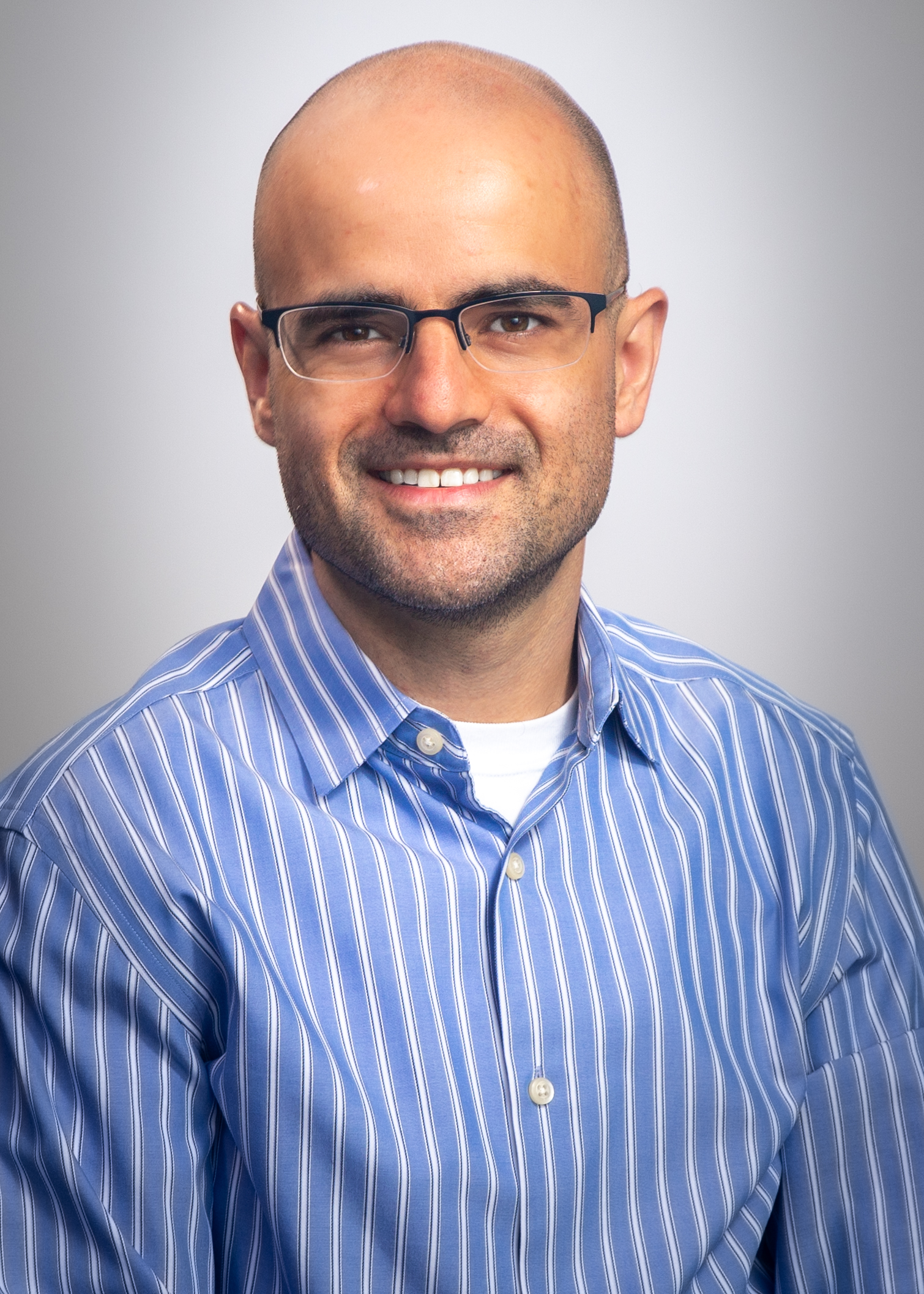 Dr. J. Pedro Teixeira
Dr. J. Pedro TeixeiraDr. Teixeira has been at UNM since 2019. He obtained his medical degree from Dartmouth Medical School and completed internal medicine residency at the University of Washington, chief medical residency at the University of Washington-Boise VA, nephrology fellowship at the University of Colorado, and critical care fellowship at Washington University/Barnes-Jewish Hospital. His academic interests lie in all areas of overlap between nephrology and critical care, and he carries out clinical trials and other research on AKI, septic shock, COVID-19, hepatorenal syndrome, acute respiratory distress syndrome (ARDS), and extracorporeal membrane oxygenation (ECMO). At UNM he attends on the inpatient nephrology consult service and in the medical ICU and serves as the medical director of the acute dialysis and continuous renal replacement therapy (CRRT) programs. An enthusiastic medical educator, Dr. Teixeira has been the Nephrology-Critical Care Track Director and an APD since arriving at UNM. He served as the PD from 2022 to 2025 and, though now stepping down from his role of PD to focus more on research, he is excited to continue to work closely with Dr. Singh in promoting the ongoing growth and development of the fellowship program.
 Dr. Darren Schmidt
Dr. Darren SchmidtDr. Schmidt earned his medical degree at Louisiana State University and completed internal medicine residency, chief medical residency, and nephrology fellowship at UNM. He next moved to the University of Mississippi where he served as an academic nephrologist and APD for the nephrology fellowship for five years. In 2009, he moved back to the region to work at a practice based in Durango, CO. After a decade serving a largely rural population in southwest Colorado, he returned to UNM in 2020. His academic interests include healthcare disparities in patients living in rural areas, acute and chronic kidney disease, and renal replacement therapy. In addition to caring for patients in all settings at UNM -- inpatient general consult service, transplant service, nephrology clinic, and chronic hemodialysis and peritoneal dialysis at DCI -- Dr. Schmidt became the fellowship APD for Outpatient Nephrology in 2021.
 Dr. Darlene Vigil
Dr. Darlene VigilA native New Mexican, Dr. Vigil earned her medical degree and completed her internal medicine residency and nephrology fellowship at UNM. After fellowship, she joined the faculty at the UNM as a staff nephrologist at the Albuquerque VA. Her academic interests include all areas of general nephrology including home dialysis. She attends on the inpatient nephrology consult service and in general nephrology clinic at the VA and oversees one of the largest peritoneal dialysis programs across the entire VA system nationwide. She served as the nephrology fellowship PD from 2018 until 2022, when she stepped down to become the section head of nephrology at the VA, and she continues to work with nephrology fellows on a daily basis as the APD for the VA Medical Center.
 Dr. Jonathan Owen
Dr. Jonathan OwenDr. Owen obtained his medical degree from Louisiana State University (LSU) and completed internal medicine residency and nephrology fellowship at UNM. After training, he moved back to LSU where he practiced academic nephrology and obtained training in interventional nephrology. In 2017, he moved back to UNM and launched our interventional nephrology program based at our affiliate hospital, UNM Sandoval Regional Medical Center (SRMC). His academic interests include hypertension, novel diagnostics and therapeutics for diabetic kidney disease, percutaneous endovascular arteriovenous fistulas, and safety and best practices for kidney biopsies. Though he occasionally attends at UNM downtown, he primarily practices inpatient and outpatient nephrology at SRMC where he performs and trains fellows in a full gamut of interventional nephrology procedures as the Interventional Nephrology Track Director and APD for SRMC.
 Dr. Christos Argyropoulos
Dr. Christos ArgyropoulosDr. Argyropoulos obtained his medical degree and PhD from the University of Patras in Greece and completed internal medicine residency at the University of Cincinnati and nephrology fellowship at the University of Pittsburg Medical Center (UPMC). Having worked in both academics and industry as a physician-scientist, he has published over 75 peer-reviewed journal articles in his areas of expertise including statistical analysis, kidney transplantation, and diabetic kidney disease. He moved from UPMC to join the faculty at UNM in 2014, becoming the Division Chief of Nephrology in 2017. Along with his research and administrative roles, he works daily alongside our fellows caring for patients with kidney disease in all settings at UNM, including the general nephrology consult service, the transplant service, nephrology clinic, and multiple DCI hemodialysis centers.
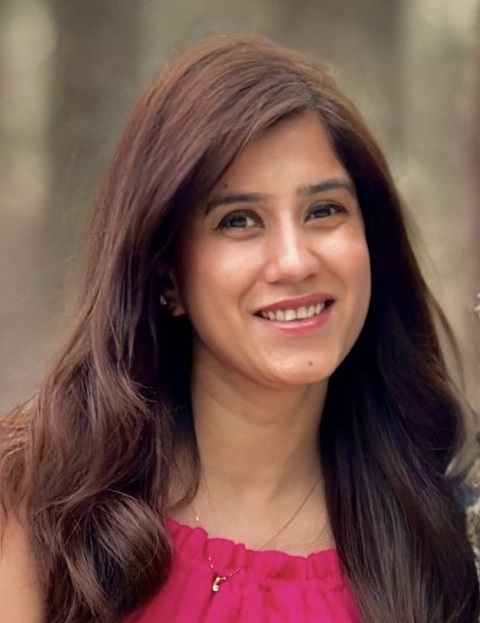 Rachna Kumari
Rachna KumariMs. Kumari is the newest addition to our nephrology fellowship. She obtained a Bachelor's degree in Apparel Manufacturing and Merchandising and a Master's degree in Human Resources (HR) from the Textile Institute of Pakistan. After a decade of professional experience in Pakistan's textile industry and HR sector, she relocated in 2022 to Albuquerque with her husband, a former UNM Nephrology fellow. She currently lives in Albuquerque with her young daughter and husband, who is now pursuing a residency in internal medicine. She has a deep passion for travel and enjoys immersing herself in different cultures and traditions. She first joined the Nephrology Division as an administrative assistant in February 2023. Her dedication and adaptability led to a promotion to Fellowship Program Coordinator in June 2025, and she's excited to begin work supporting our fellows in this new role.
Research is an important aspect of nephrology training at UNM. Fellows are provided approximately one month of research time each year and are required to carry out at least one scholarly project during fellowship. In addition to traditional basic, clinical, or epidemiological research, scholarly projects can include review articles or case report abstracts presented at local or national conferences. The nature and extent of research projects are tailored to each fellow’s individual interests, with additional research time available for fellows carrying out more extensive research.
Nephrology is among the most productive divisions within the DOIM in research. The division is also the home of the Center for Healthcare Equity in Kidney Disease (CHEK-D), a signature research program of the UNM Health Sciences Center focused on developing and supporting scientists and clinicians in basic, clinical, and translational research to reduce and eliminate disparities in health processes and outcomes related to kidney disease. Our faculty have the knowledge, resources, and experience to support fellows interested in research of all kinds, including health services research and epidemiology, medical education research, clinical trials, and basic science. Fellows are paired with a faculty mentor with research expertise in the fellow's area of interest and are provided personalized support every step of the way. We strongly encourage fellows to submit and present research or case report abstracts at national meetings, such as the American Society of Nephrology and National Kidney Foundation, and funding for travel to such conferences is often provided by the division.
Recent Manuscripts Published by UNM Nephrology Fellows:
Fellow names in bold and underlined. Nephrology division faculty in bold.
Recent National Conference Abstracts Published by UNM Nephrology Fellows:
Fellow names in bold and underlined. Nephrology division faculty in bold.
Beyond the two-year general nephrology followship, additional specialized training is available through the Nephrology-Critical Care, Clinical Informatics, and Interventional Nephrology tracks. In the case of Nephrology-Critical Care and Interventional Nephrology, interested applicants must rank these specific tracks within the NRMP system (Nephrology/Critical Care, 1962148F1; Nephrology/Other-Interventional, 1962148F2).
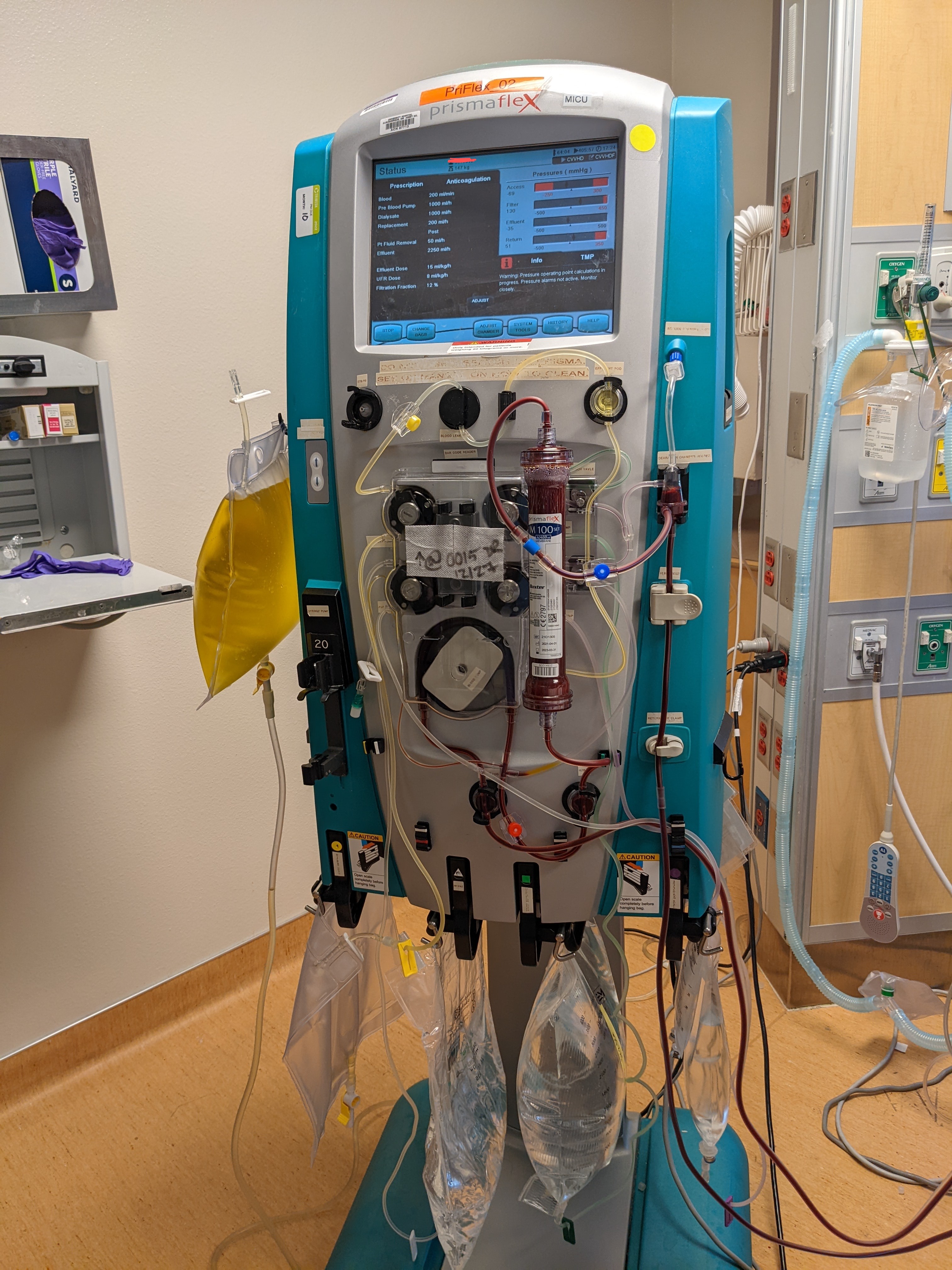 The combined Nephrology-Critical Care track is an intensive combined program for highly qualified applicants. The track allows the fellows to directly transition from nephrology training into critical care fellowship in the Pulmonary/Critical Care Division at UNM without having to reapply. To better prepare for critical care, during the nephrology training fellows receive dedicated one-on-one sessions by UNM's critical care nephrologist, Dr. J. Pedro Teixeira. Highlights of being a critical care fellow at UNM including exposure to multiple subspeciality ICUs (medical, trauma-surgical, neurosurgical, and cardiothoracic-vascular), significant hands-on exposure to ECMO and other forms of mechanical cardiovascular support, and extensive procedural training. The Medical ICU at UNMH is a truly multidisciplinary environment that welcomes intensivists of all backgrounds and is staffed by faculty with training in pulmonary medicine, internal medicine, emergency medicine, anesthesia, nephrology, and infectious disease.
The combined Nephrology-Critical Care track is an intensive combined program for highly qualified applicants. The track allows the fellows to directly transition from nephrology training into critical care fellowship in the Pulmonary/Critical Care Division at UNM without having to reapply. To better prepare for critical care, during the nephrology training fellows receive dedicated one-on-one sessions by UNM's critical care nephrologist, Dr. J. Pedro Teixeira. Highlights of being a critical care fellow at UNM including exposure to multiple subspeciality ICUs (medical, trauma-surgical, neurosurgical, and cardiothoracic-vascular), significant hands-on exposure to ECMO and other forms of mechanical cardiovascular support, and extensive procedural training. The Medical ICU at UNMH is a truly multidisciplinary environment that welcomes intensivists of all backgrounds and is staffed by faculty with training in pulmonary medicine, internal medicine, emergency medicine, anesthesia, nephrology, and infectious disease.
We support interested applicants in pursuing a combined fellowship experience with Clinical Informatics. Clinical Informatics is a 2-year ACGME-accredited fellowship open to trainees from all specialties. Combined training, which can result in reduced total training time (estimated to be a reduction of 6 months when combined with a two-year clinical nephrology fellowship), can be structured in partnership with the Clinical Informatics Program at UNM to prepare fellows for board eligibility in both disciplines while enhancing their impact at the intersection of clinical care, technology, and healthcare systems. Interested fellows should apply to our general nephrology track and email us prior to your nephrology interview date to indicate your interest in this pathway. If, after your nephrology interview, you wish to pursue this pathway, candidates will undergo a half-day interview with faculty from the division of Clinical Informatics.

Please note -- the interventional nephrology track is not available for July 2026 cycle.
Fellows in the three-year Interventional Nephrology track work closely with Dr. Jonathan Owen, FASDIN (Fellow of the American Society of Diagnostic and International Nephrology) at our affiliate hospital, Sandoval Regional Medical Center (SRMC), and develop expertise in all manner of procedures, leading to ASDIN certification. Procedures performed include percutaneous native and transplant kidney biopsies, fistulograms, percutaneous peritoneal dialysis catheter placement, percutaneous arteriovenous fistula creation, and temporary and tunneled hemodialysis catheters. Fellows are also provided a one-month away rotation to specifically increase their experience performing procedures with arteriovenous grafts.
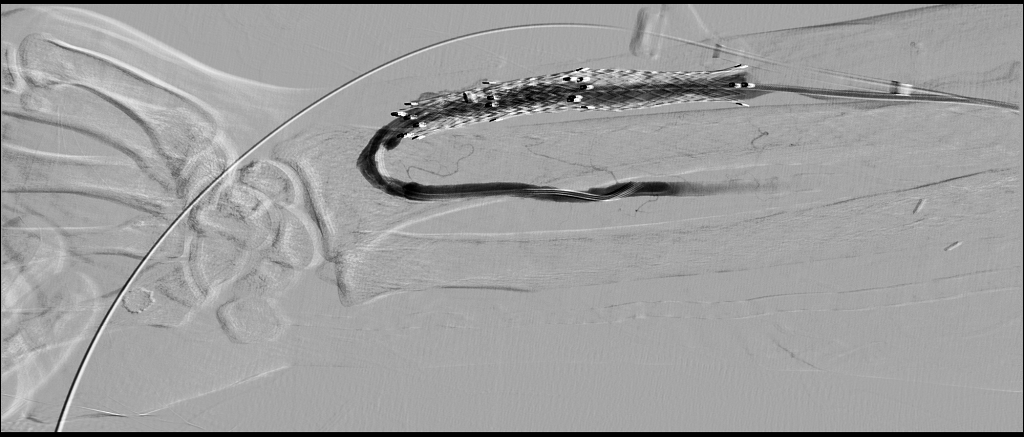
International medical graduates (IMGs) who have completed or are completing a U.S. internal medicine residency should apply in same manner as all other applicants. We occasionally accept IMG applicants who have not yet completed a U.S. internal medicine residency. Such applicants are referred to by the ACGME as Exceptionally Qualified Candidates. To meet the criteria for an exceptionally qualified candidate, you must have:
Additional requirements include:
Should you meet these requirements, we encourage you to follow the instructions below:
The following benefits are provided to all UNM housestaff:
Additional information about UNM housestaff benefits is available here.
The fellowship program is designed to be flexible, equipping you for a career in clinical nephrology, while also allowing fellows interested in academic medicine to pursue opportunities for teaching or research. The first year emphasizes the acquisition of basic skills in inpatient clinical nephrology, including expertise in the management of AKI, electrolyte and acid-base disorders, renal transplant, acute hemodialysis, and CRRT. First-year fellows also learn outpatient kidney disease management in a once weekly half-day continuity clinic. Along with further clinical experience in inpatient and outpatient nephrology, the second year provides additional focus on outpatient dialysis (both hemodialysis and peritoneal dialysis), in partnership with Dialysis Clinic Inc. (DCI), the largest not-for-profit dialysis organization in the U.S. which administers the community dialysis clinics staffed by UNM faculty. Finally, elective time is built into both years of training but increases during the second year, allowing fellows to individualize their pursuit of specific interests, be it the acquisition of new clinical skills (e.g., procedures or plasma exchange), development as a clinician-educator, or experience conducting clinical or basic science research.
During the first year, we identify a faculty mentor who provides you with general support and guidance for long-term career planning. The faculty mentor will also help you connect with the faculty best equipped to help you develop and pursue your research interests.
*Not an exhaustive list of available electives.
Once per month, fellows are excused entirely from clinical duties (no pre-rounding or rounding) for the full morning for in-person dedicated fellow-only teaching. That morning the faculty are responsible for all clinical care, including rounding and writing notes on all patients on the inpatient services, allowing this teaching time to be completely protected. A typical 4-hour academic half-day would include two interactive case conferences presented by a fellow or faculty member alternating with two fellow-specific didactic sessions.
Division-wide conference, attended by faculty and fellows alike, is held every Monday at noon to 1 pm, and often features Renal Grand Rounds, in which local or visiting faculty present updates or research developments in nephrology. In addition, for two Tuesdays each month at noon to 1 pm we have additional conferences geared specifically towards the fellows. Sessions include general didactic topics and journal clubs that are usually focused on seminal trials and research studies that every nephrology fellow should read.
Once weekly on Wednesday we have an additional hour of protected time provided for fellow-only board review. These sessions are typically question-based interactive sessions led by the faculty.
Arkana conferences are among the most popular in the division. In lieu of weekly noon conference, four times per year the world-class subspecialty renal pathologists from Arkana lead renal pathology conference via Zoom. UNM fellows or faculty present interesting local cases, first generating interactive discussion of the clinical features of the case. The pathologists follow with an in-depth review of the histopathologic features of each case, concluding with a series of high-yield teaching points.
With students, residents, and fellows from other programs frequently rotating on electives with our inpatient services at UNMH and the VA, teaching opportunities abound for interested fellows. Formal training in medical education is also available through the UNM SOM Office for Continuous Professional Learning, including the popular Residents as Educators course.
 Dr. Namita Singh
Dr. Namita SinghDr. Singh has been at UNM since 2020. She obtained her medical degree from Maulana Azad Medical College in India and completed internal medicine residency at Johns Hopkins University/Sinai Hospital and nephrology fellowship at Maine Medical Center/Tufts University. She practiced nephrology in Maine and Utah before coming to UNM. Her academic interests include transplant, hypertension, home dialysis, young adults with kidney disease, and novel therapies for glomerular disease targeting the complement pathway. At UNM she cares for patients on the inpatient general consult and transplant services and in nephrology clinic and oversees the provision of hemodialysis and peritoneal dialysis to patients with ESKD at DCI. Soon after becoming the Associate Program Director (APD) for Fellow Didactics in 2021, she partnered with Dr. Teixeira in leading a major overhaul of the curriculum which included the introduction in 2022 of the protected nephrology fellow academic-half days, which have been an overwhelming success. After four years in the APD role, she was honored to be appointed Program Director (PD) in 2025 and she is excited to lead the ongoing evolution of the program.
 Dr. J. Pedro Teixeira
Dr. J. Pedro TeixeiraDr. Teixeira has been at UNM since 2019. He obtained his medical degree from Dartmouth Medical School and completed internal medicine residency at the University of Washington, chief medical residency at the University of Washington-Boise VA, nephrology fellowship at the University of Colorado, and critical care fellowship at Washington University/Barnes-Jewish Hospital. His academic interests lie in all areas of overlap between nephrology and critical care, and he carries out clinical trials and other research on AKI, septic shock, COVID-19, hepatorenal syndrome, acute respiratory distress syndrome (ARDS), and extracorporeal membrane oxygenation (ECMO). At UNM he attends on the inpatient nephrology consult service and in the medical ICU and serves as the medical director of the acute dialysis and continuous renal replacement therapy (CRRT) programs. An enthusiastic medical educator, Dr. Teixeira has been the Nephrology-Critical Care Track Director and an APD since arriving at UNM. He served as the PD from 2022 to 2025 and, though now stepping down from his role of PD to focus more on research, he is excited to continue to work closely with Dr. Singh in promoting the ongoing growth and development of the fellowship program.
 Dr. Darren Schmidt
Dr. Darren SchmidtDr. Schmidt earned his medical degree at Louisiana State University and completed internal medicine residency, chief medical residency, and nephrology fellowship at UNM. He next moved to the University of Mississippi where he served as an academic nephrologist and APD for the nephrology fellowship for five years. In 2009, he moved back to the region to work at a practice based in Durango, CO. After a decade serving a largely rural population in southwest Colorado, he returned to UNM in 2020. His academic interests include healthcare disparities in patients living in rural areas, acute and chronic kidney disease, and renal replacement therapy. In addition to caring for patients in all settings at UNM -- inpatient general consult service, transplant service, nephrology clinic, and chronic hemodialysis and peritoneal dialysis at DCI -- Dr. Schmidt became the fellowship APD for Outpatient Nephrology in 2021.
 Dr. Darlene Vigil
Dr. Darlene VigilA native New Mexican, Dr. Vigil earned her medical degree and completed her internal medicine residency and nephrology fellowship at UNM. After fellowship, she joined the faculty at the UNM as a staff nephrologist at the Albuquerque VA. Her academic interests include all areas of general nephrology including home dialysis. She attends on the inpatient nephrology consult service and in general nephrology clinic at the VA and oversees one of the largest peritoneal dialysis programs across the entire VA system nationwide. She served as the nephrology fellowship PD from 2018 until 2022, when she stepped down to become the section head of nephrology at the VA, and she continues to work with nephrology fellows on a daily basis as the APD for the VA Medical Center.
 Dr. Jonathan Owen
Dr. Jonathan OwenDr. Owen obtained his medical degree from Louisiana State University (LSU) and completed internal medicine residency and nephrology fellowship at UNM. After training, he moved back to LSU where he practiced academic nephrology and obtained training in interventional nephrology. In 2017, he moved back to UNM and launched our interventional nephrology program based at our affiliate hospital, UNM Sandoval Regional Medical Center (SRMC). His academic interests include hypertension, novel diagnostics and therapeutics for diabetic kidney disease, percutaneous endovascular arteriovenous fistulas, and safety and best practices for kidney biopsies. Though he occasionally attends at UNM downtown, he primarily practices inpatient and outpatient nephrology at SRMC where he performs and trains fellows in a full gamut of interventional nephrology procedures as the Interventional Nephrology Track Director and APD for SRMC.
 Dr. Christos Argyropoulos
Dr. Christos ArgyropoulosDr. Argyropoulos obtained his medical degree and PhD from the University of Patras in Greece and completed internal medicine residency at the University of Cincinnati and nephrology fellowship at the University of Pittsburg Medical Center (UPMC). Having worked in both academics and industry as a physician-scientist, he has published over 75 peer-reviewed journal articles in his areas of expertise including statistical analysis, kidney transplantation, and diabetic kidney disease. He moved from UPMC to join the faculty at UNM in 2014, becoming the Division Chief of Nephrology in 2017. Along with his research and administrative roles, he works daily alongside our fellows caring for patients with kidney disease in all settings at UNM, including the general nephrology consult service, the transplant service, nephrology clinic, and multiple DCI hemodialysis centers.
 Rachna Kumari
Rachna KumariMs. Kumari is the newest addition to our nephrology fellowship. She obtained a Bachelor's degree in Apparel Manufacturing and Merchandising and a Master's degree in Human Resources (HR) from the Textile Institute of Pakistan. After a decade of professional experience in Pakistan's textile industry and HR sector, she relocated in 2022 to Albuquerque with her husband, a former UNM Nephrology fellow. She currently lives in Albuquerque with her young daughter and husband, who is now pursuing a residency in internal medicine. She has a deep passion for travel and enjoys immersing herself in different cultures and traditions. She first joined the Nephrology Division as an administrative assistant in February 2023. Her dedication and adaptability led to a promotion to Fellowship Program Coordinator in June 2025, and she's excited to begin work supporting our fellows in this new role.
Research is an important aspect of nephrology training at UNM. Fellows are provided approximately one month of research time each year and are required to carry out at least one scholarly project during fellowship. In addition to traditional basic, clinical, or epidemiological research, scholarly projects can include review articles or case report abstracts presented at local or national conferences. The nature and extent of research projects are tailored to each fellow’s individual interests, with additional research time available for fellows carrying out more extensive research.
Nephrology is among the most productive divisions within the DOIM in research. The division is also the home of the Center for Healthcare Equity in Kidney Disease (CHEK-D), a signature research program of the UNM Health Sciences Center focused on developing and supporting scientists and clinicians in basic, clinical, and translational research to reduce and eliminate disparities in health processes and outcomes related to kidney disease. Our faculty have the knowledge, resources, and experience to support fellows interested in research of all kinds, including health services research and epidemiology, medical education research, clinical trials, and basic science. Fellows are paired with a faculty mentor with research expertise in the fellow's area of interest and are provided personalized support every step of the way. We strongly encourage fellows to submit and present research or case report abstracts at national meetings, such as the American Society of Nephrology and National Kidney Foundation, and funding for travel to such conferences is often provided by the division.
Recent Manuscripts Published by UNM Nephrology Fellows:
Fellow names in bold and underlined. Nephrology division faculty in bold.
Recent National Conference Abstracts Published by UNM Nephrology Fellows:
Fellow names in bold and underlined. Nephrology division faculty in bold.
Beyond the two-year general nephrology followship, additional specialized training is available through the Nephrology-Critical Care, Clinical Informatics, and Interventional Nephrology tracks. In the case of Nephrology-Critical Care and Interventional Nephrology, interested applicants must rank these specific tracks within the NRMP system (Nephrology/Critical Care, 1962148F1; Nephrology/Other-Interventional, 1962148F2).
 The combined Nephrology-Critical Care track is an intensive combined program for highly qualified applicants. The track allows the fellows to directly transition from nephrology training into critical care fellowship in the Pulmonary/Critical Care Division at UNM without having to reapply. To better prepare for critical care, during the nephrology training fellows receive dedicated one-on-one sessions by UNM's critical care nephrologist, Dr. J. Pedro Teixeira. Highlights of being a critical care fellow at UNM including exposure to multiple subspeciality ICUs (medical, trauma-surgical, neurosurgical, and cardiothoracic-vascular), significant hands-on exposure to ECMO and other forms of mechanical cardiovascular support, and extensive procedural training. The Medical ICU at UNMH is a truly multidisciplinary environment that welcomes intensivists of all backgrounds and is staffed by faculty with training in pulmonary medicine, internal medicine, emergency medicine, anesthesia, nephrology, and infectious disease.
The combined Nephrology-Critical Care track is an intensive combined program for highly qualified applicants. The track allows the fellows to directly transition from nephrology training into critical care fellowship in the Pulmonary/Critical Care Division at UNM without having to reapply. To better prepare for critical care, during the nephrology training fellows receive dedicated one-on-one sessions by UNM's critical care nephrologist, Dr. J. Pedro Teixeira. Highlights of being a critical care fellow at UNM including exposure to multiple subspeciality ICUs (medical, trauma-surgical, neurosurgical, and cardiothoracic-vascular), significant hands-on exposure to ECMO and other forms of mechanical cardiovascular support, and extensive procedural training. The Medical ICU at UNMH is a truly multidisciplinary environment that welcomes intensivists of all backgrounds and is staffed by faculty with training in pulmonary medicine, internal medicine, emergency medicine, anesthesia, nephrology, and infectious disease.
We support interested applicants in pursuing a combined fellowship experience with Clinical Informatics. Clinical Informatics is a 2-year ACGME-accredited fellowship open to trainees from all specialties. Combined training, which can result in reduced total training time (estimated to be a reduction of 6 months when combined with a two-year clinical nephrology fellowship), can be structured in partnership with the Clinical Informatics Program at UNM to prepare fellows for board eligibility in both disciplines while enhancing their impact at the intersection of clinical care, technology, and healthcare systems. Interested fellows should apply to our general nephrology track and email us prior to your nephrology interview date to indicate your interest in this pathway. If, after your nephrology interview, you wish to pursue this pathway, candidates will undergo a half-day interview with faculty from the division of Clinical Informatics.

Please note -- the interventional nephrology track is not available for July 2026 cycle.
Fellows in the three-year Interventional Nephrology track work closely with Dr. Jonathan Owen, FASDIN (Fellow of the American Society of Diagnostic and International Nephrology) at our affiliate hospital, Sandoval Regional Medical Center (SRMC), and develop expertise in all manner of procedures, leading to ASDIN certification. Procedures performed include percutaneous native and transplant kidney biopsies, fistulograms, percutaneous peritoneal dialysis catheter placement, percutaneous arteriovenous fistula creation, and temporary and tunneled hemodialysis catheters. Fellows are also provided a one-month away rotation to specifically increase their experience performing procedures with arteriovenous grafts.

International medical graduates (IMGs) who have completed or are completing a U.S. internal medicine residency should apply in same manner as all other applicants. We occasionally accept IMG applicants who have not yet completed a U.S. internal medicine residency. Such applicants are referred to by the ACGME as Exceptionally Qualified Candidates. To meet the criteria for an exceptionally qualified candidate, you must have:
Additional requirements include:
Should you meet these requirements, we encourage you to follow the instructions below:
The following benefits are provided to all UNM housestaff:
Additional information about UNM housestaff benefits is available here.
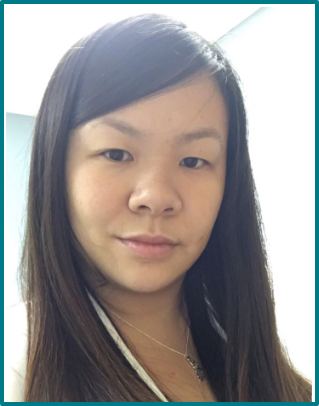
The UNM faculty are some of the most supportive, kindest people you will ever meet. They are all brilliant masters in the field of nephrology, which is only overshadowed by how big their hearts are. The division supports their fellows in every way they conceivably can.
 Hometowns: Dharan, Saudi Arabia; Houston, TX; and Simsbury, CT
Hometowns: Dharan, Saudi Arabia; Houston, TX; and Simsbury, CT
Medical School: Dow International Medical College, Pakistan
Residency: Aga Khan University Hospital, Karachi, Pakistan
Year/Track: Second-year, General Nephrology
 Hometown: El Paso, TX
Hometown: El Paso, TX
Medical School: Sindh Medical College, Pakistan
Residency: BronxCare Health System Program, Bronx, NY
Year/Track: Second-year, General Nephrology
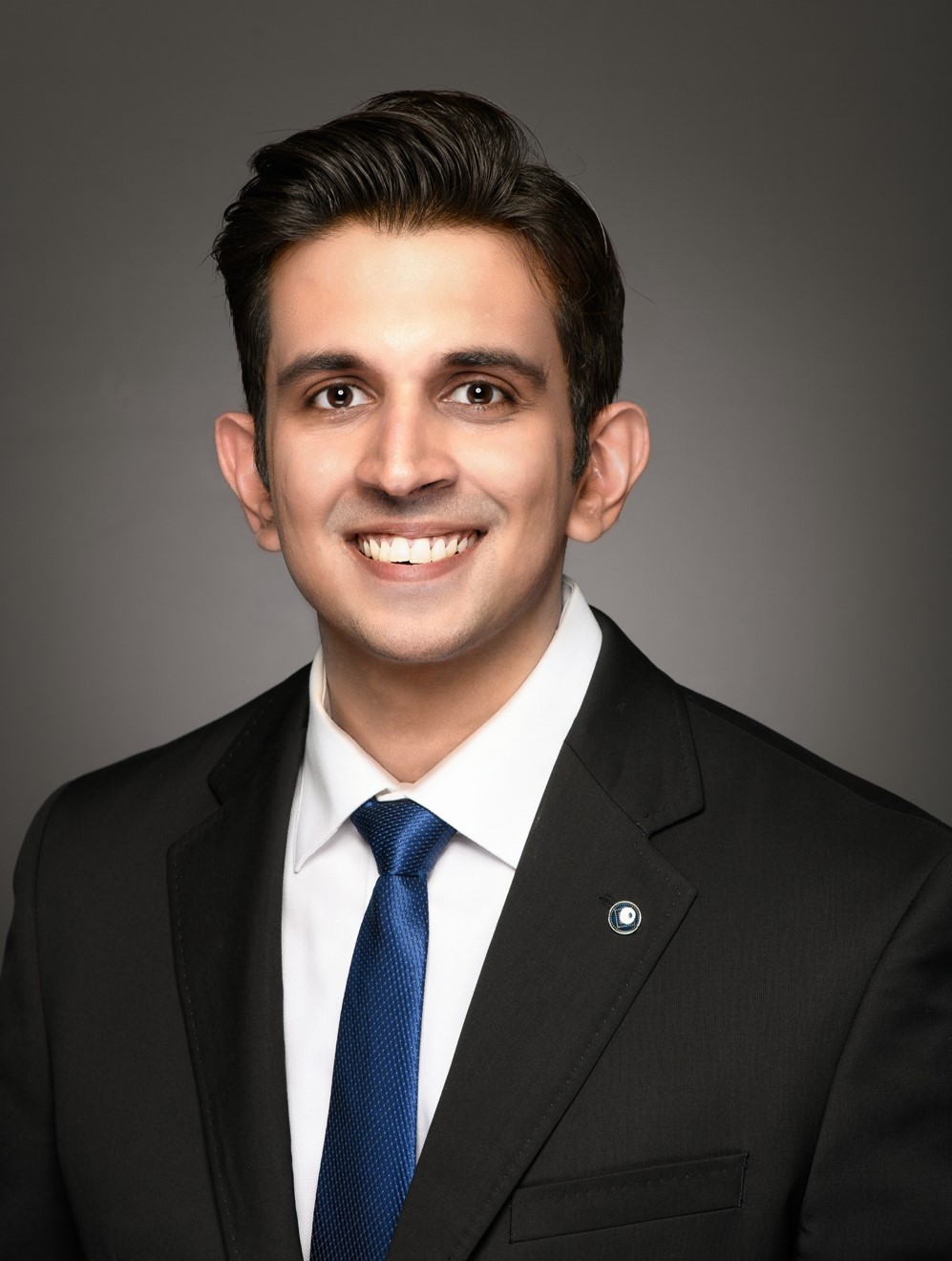 Hometown: Chaguanas, Trinidad & Tobago
Hometown: Chaguanas, Trinidad & Tobago
Medical School: University of the West Indies Faculty of Medicine St. Augustine, Trinidad
Residency: University of Kansas School of Medicine, Wichita
Year/Track: Second-year, Nephrology - Critical Care
 Hometowns: Vancouver, Canada, and Omaha, Nebraska
Hometowns: Vancouver, Canada, and Omaha, Nebraska
Medical School: Liaquat University of Medical & Health Sciences, Jamshoro, Pakistan
Residency: Liaquat University Hospital, Hyderabad, Pakistan
Year/Track: First-year, General Nephrology
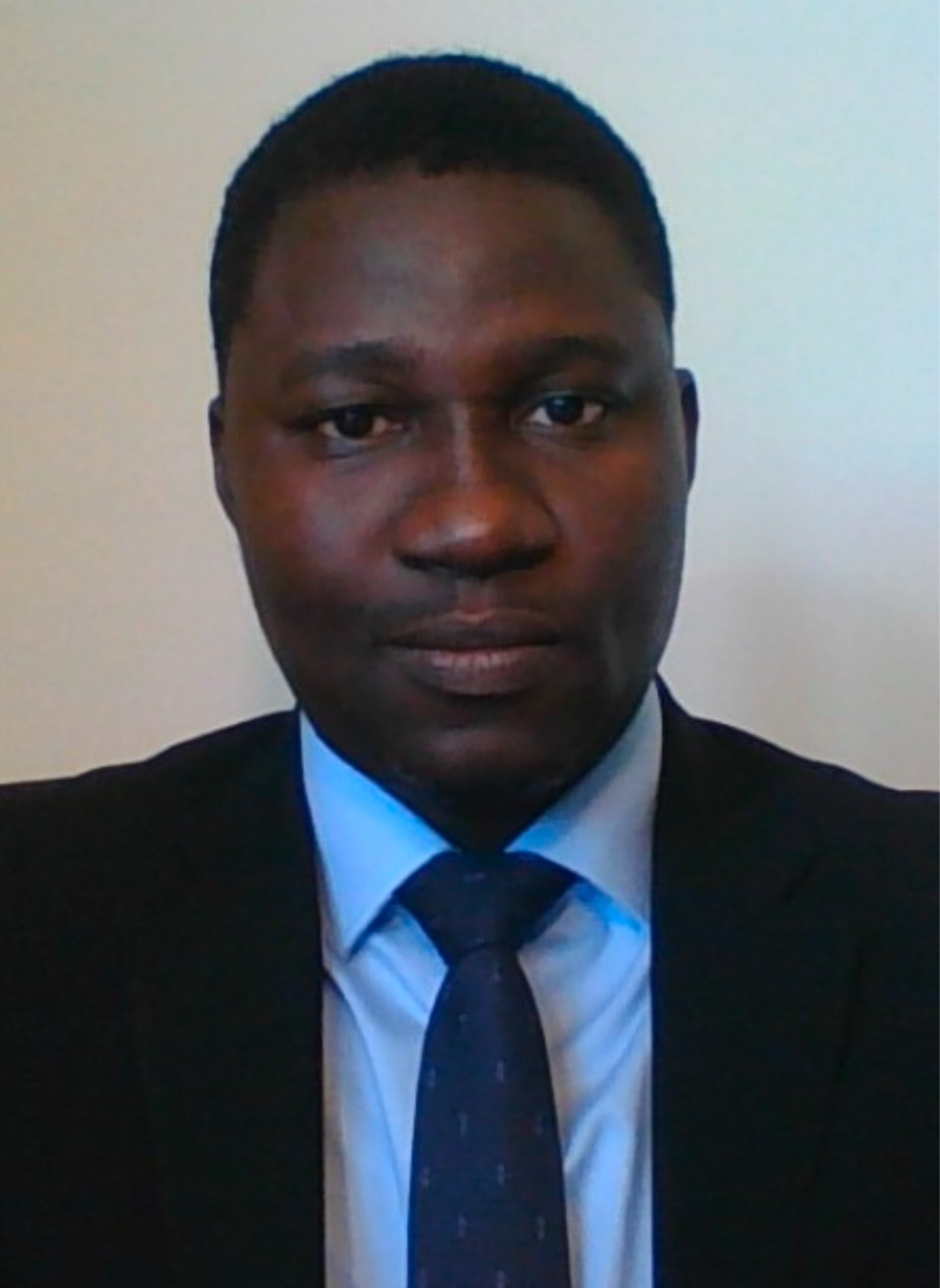 Hometowns: Akure, Nigeria; McAllen, TX; and Albuquerque, NM
Hometowns: Akure, Nigeria; McAllen, TX; and Albuquerque, NM
Medical School: University of Ilorin College of Health Sciences, Nigeria
Residency: UNM
Year/Track: First-year, General Nephrology
 Hometown: Hermosillo, Mexico
Hometown: Hermosillo, Mexico
Medical School: Universidad de Sonora Departamento de Medicina y Ciencias de la Salud, Hermosillo, Mexico
Residency & Chief Residency: UNM
Year/Track: First-year, General Nephrology
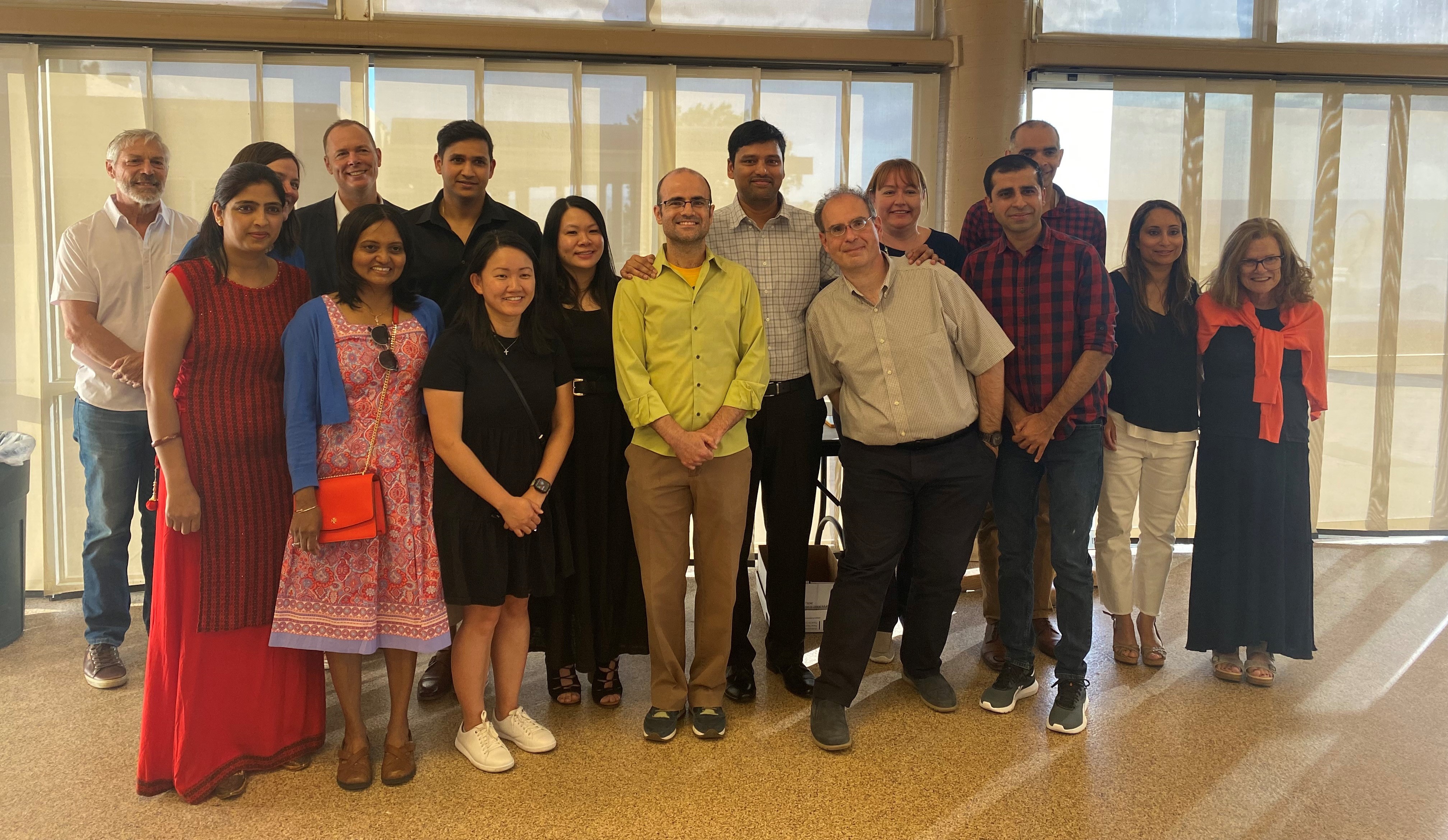
2023 fellow graduation party.
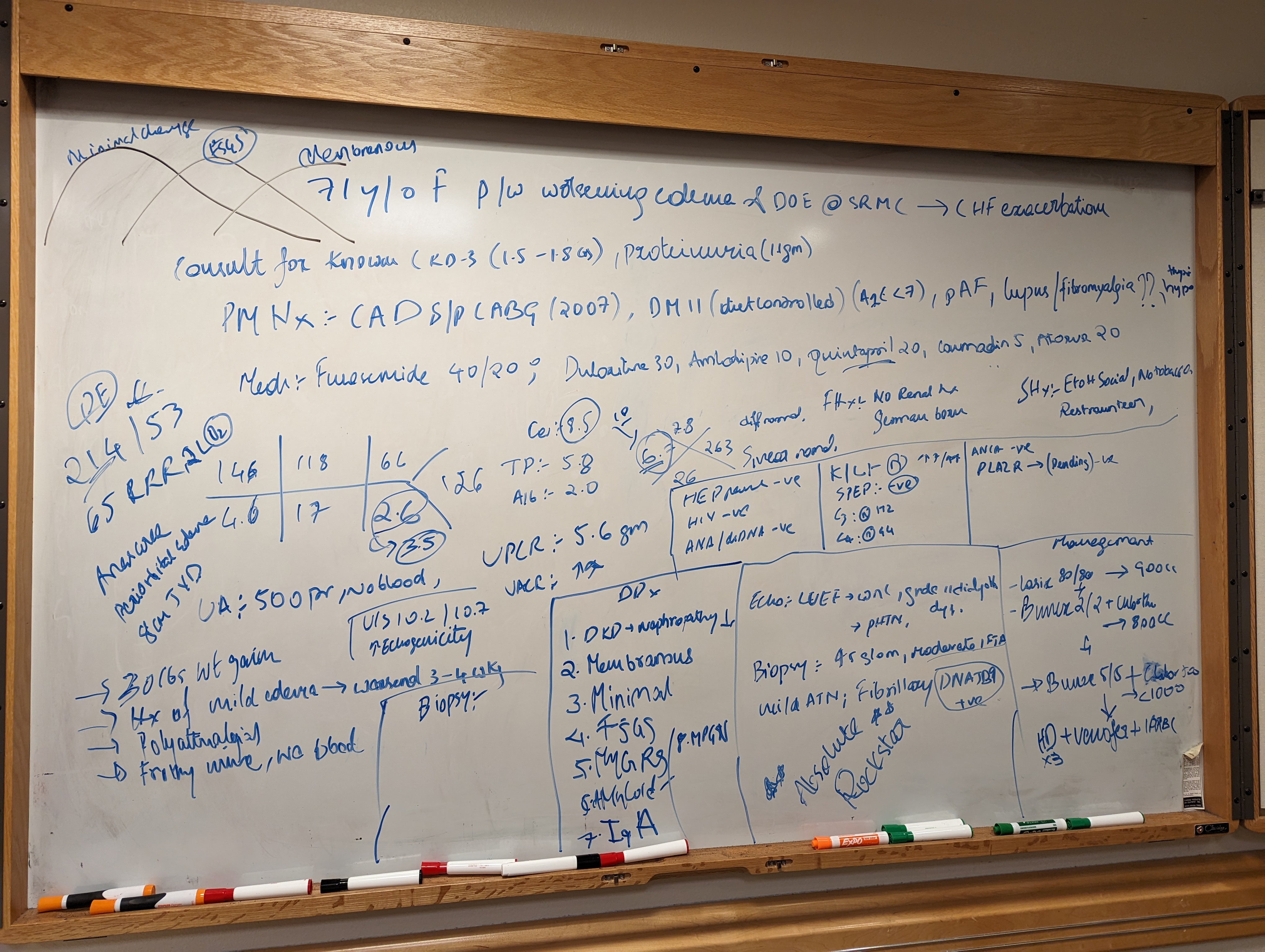
Conference presentation of a case of fibrillary GN by Dr. Jon Owen during the January 2023 academic half-day.
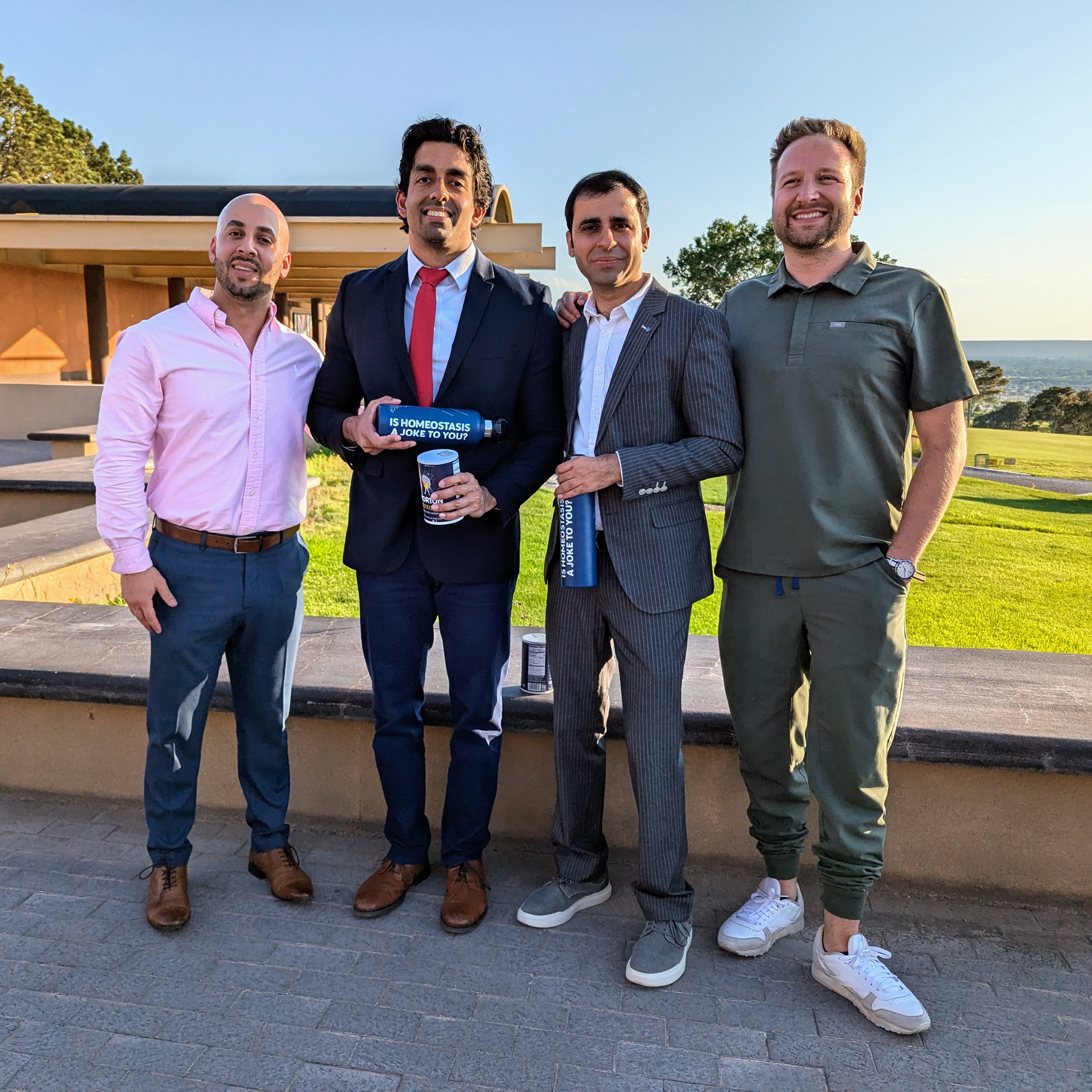
Fellows (left to right) Luis Madera Marin (class of 2025), Zan Shareef (class of 2024), Raja Ravender (class of 2024), and AJ Moghaddam (class of 2025) at 2024 fellow graduation party.
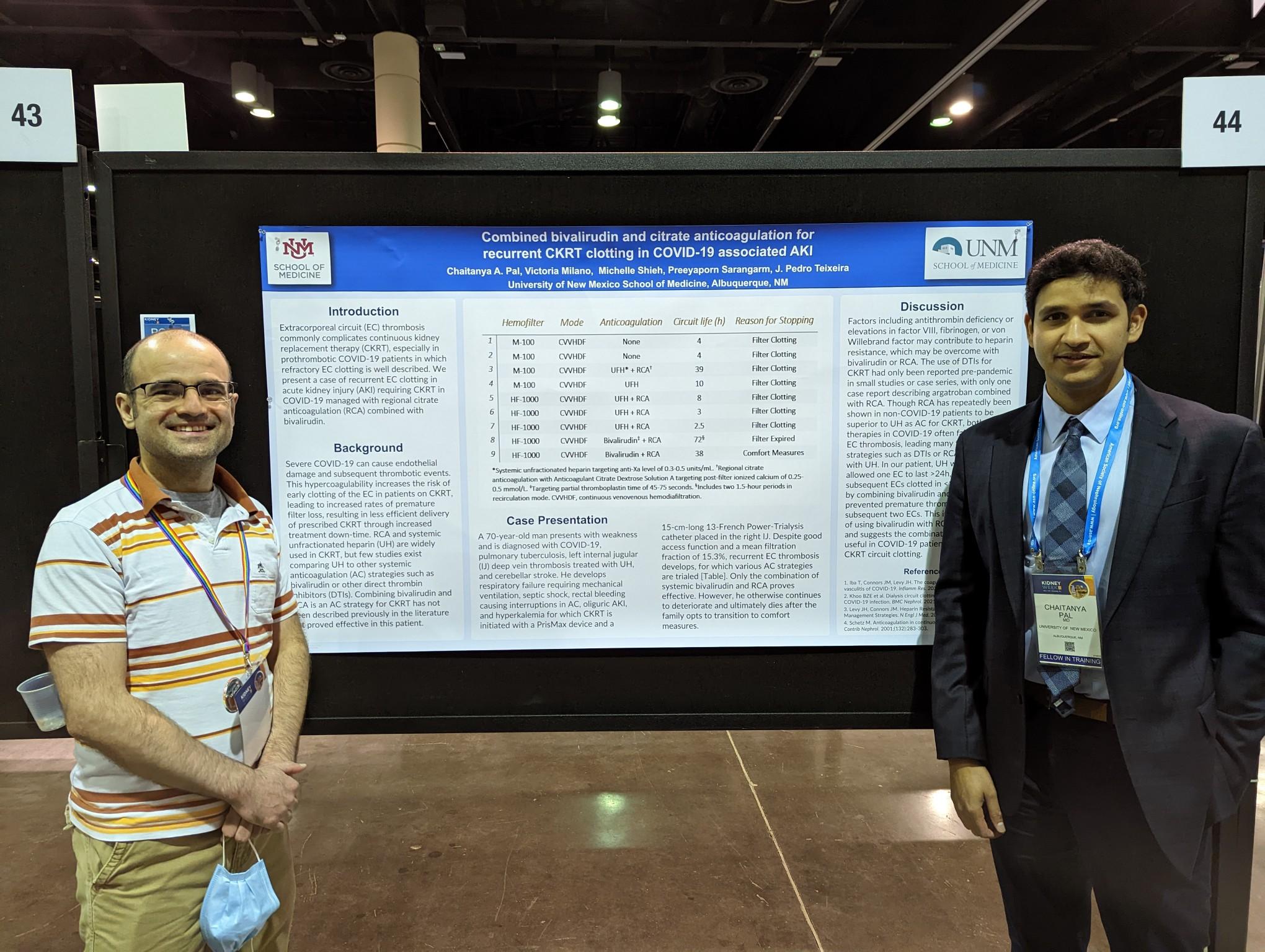
Dr. Anil Pal (class of 2023) presenting his case report abstract alongside Dr. J. Pedro Teixeira at 2022 ASN Kidney Week Conference in Orlando.
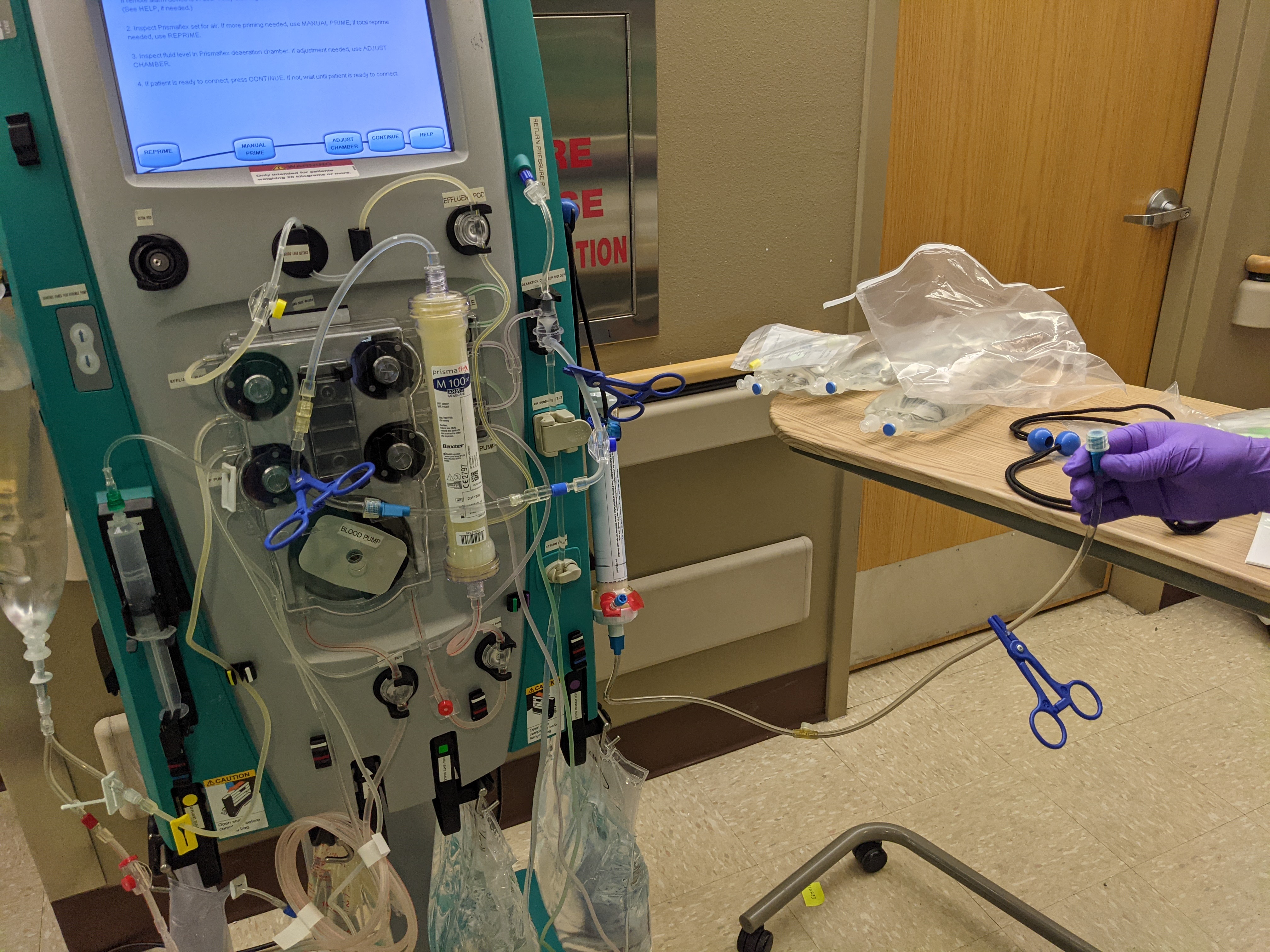
ICU RN priming CRRT circuit being used for experimental "stem cell" therapy during the COVID-19 pandemic.
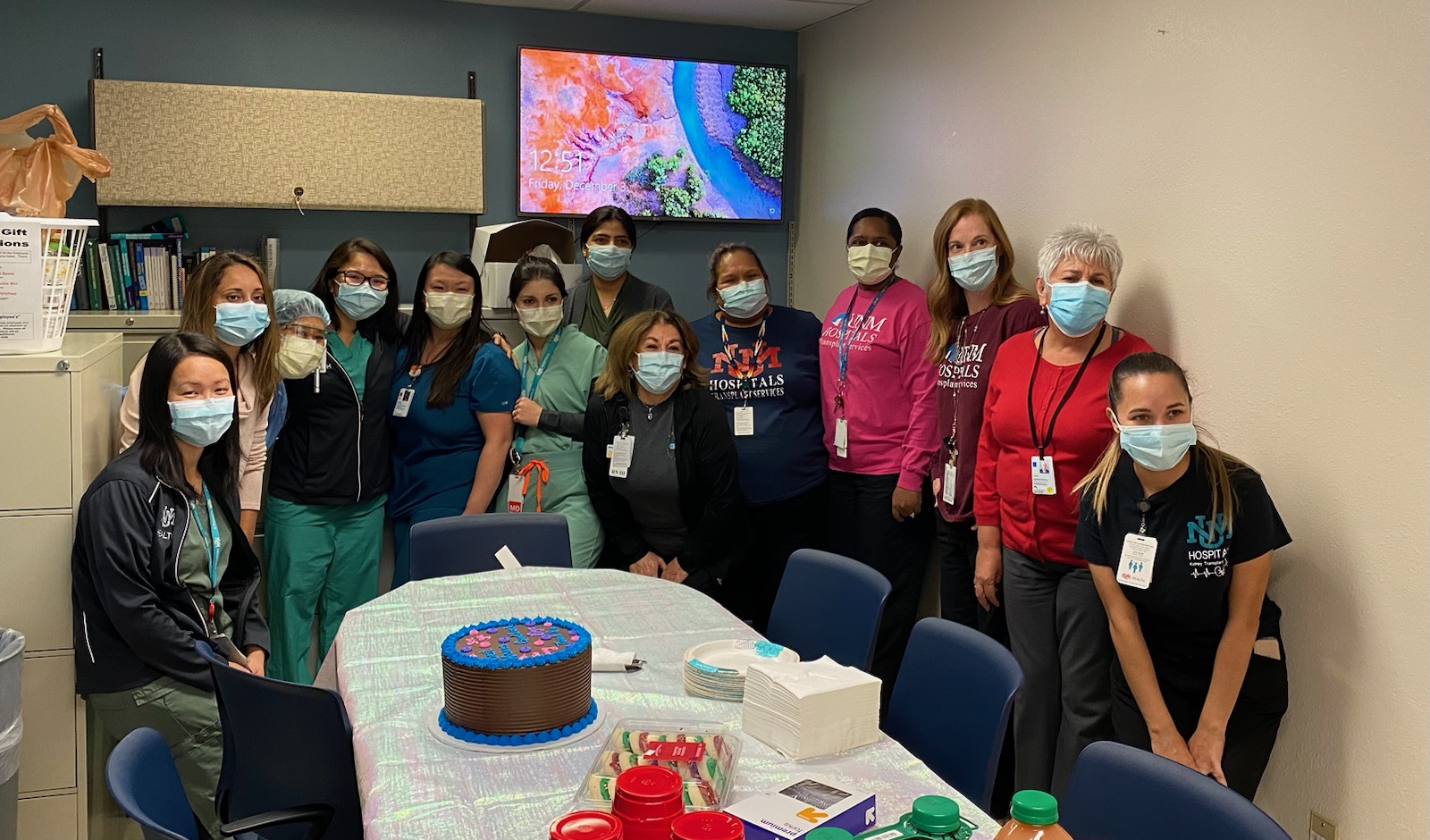
Party at UNMH Transplant Clinic.
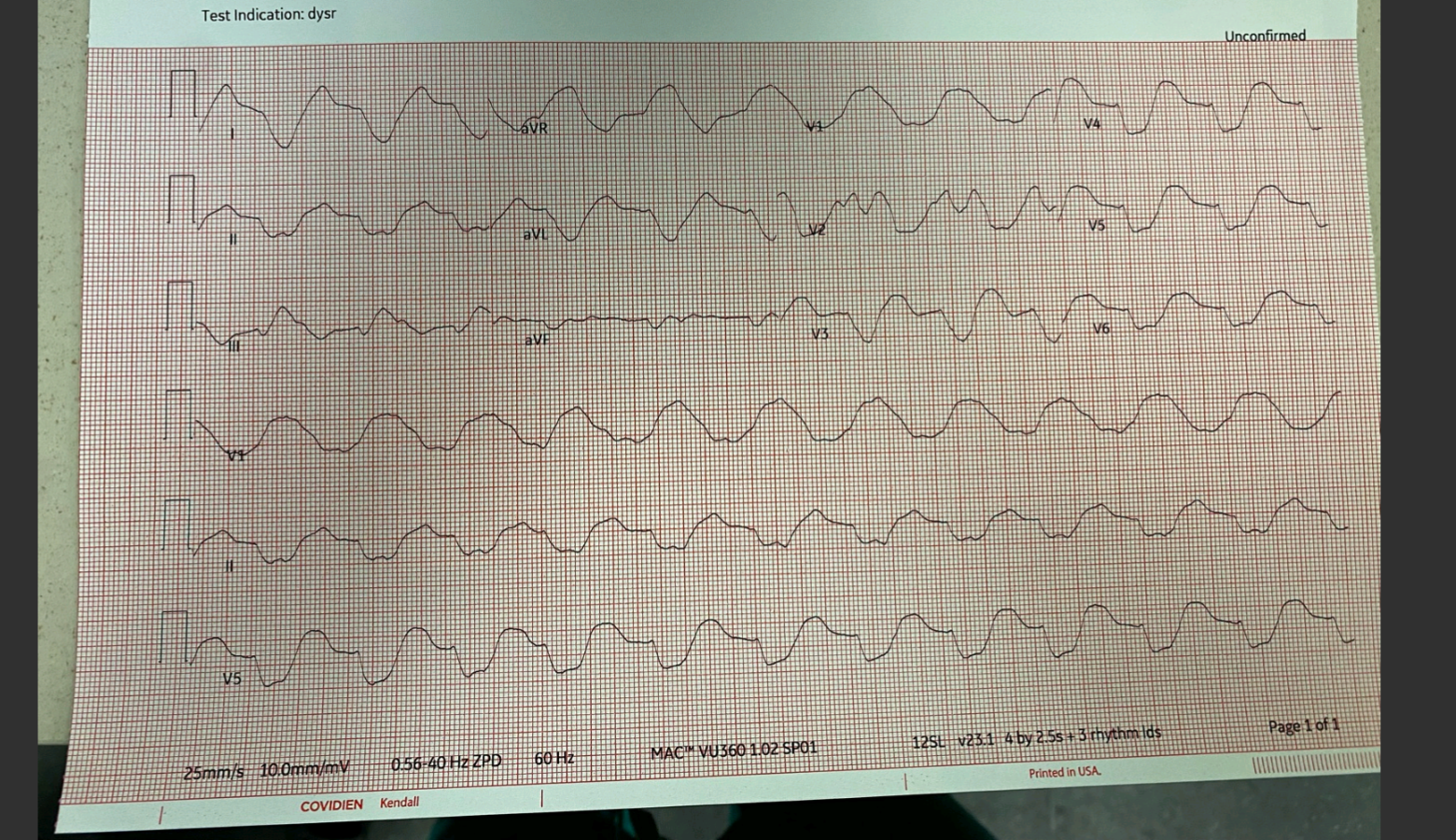
EKG from patient admitted to UNMH ICU with severe hyperkalemia (who survived after dialysis prescribed by an UNM Nephrology fellow!). (Shared with permission.)
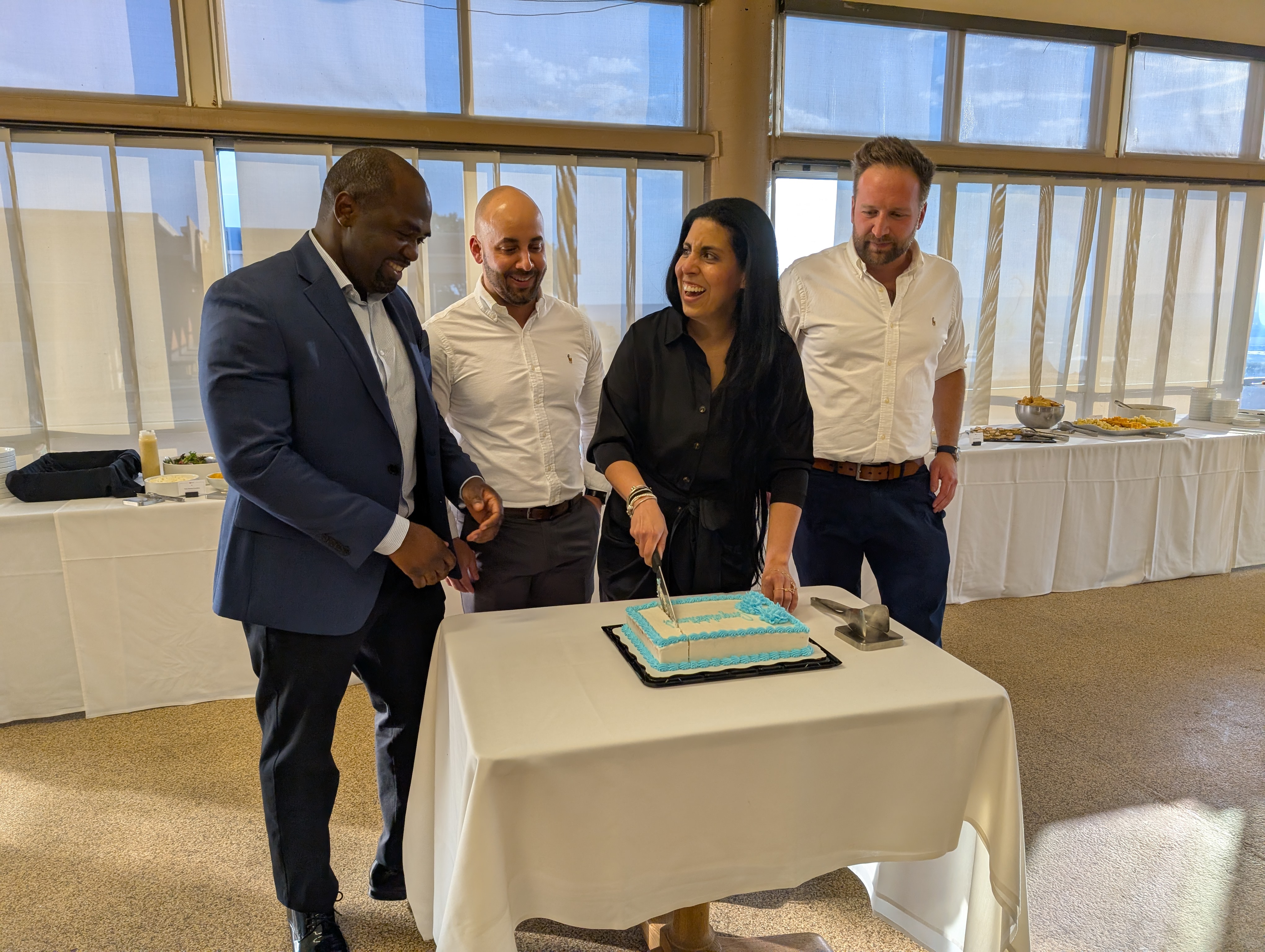
Graduating fellows (left to right) Kingsley Onuoha, Luis Madera Marin, Irmaris Quinones Vargas, and AJ Moghaddam at 2025 fellow graduation party.
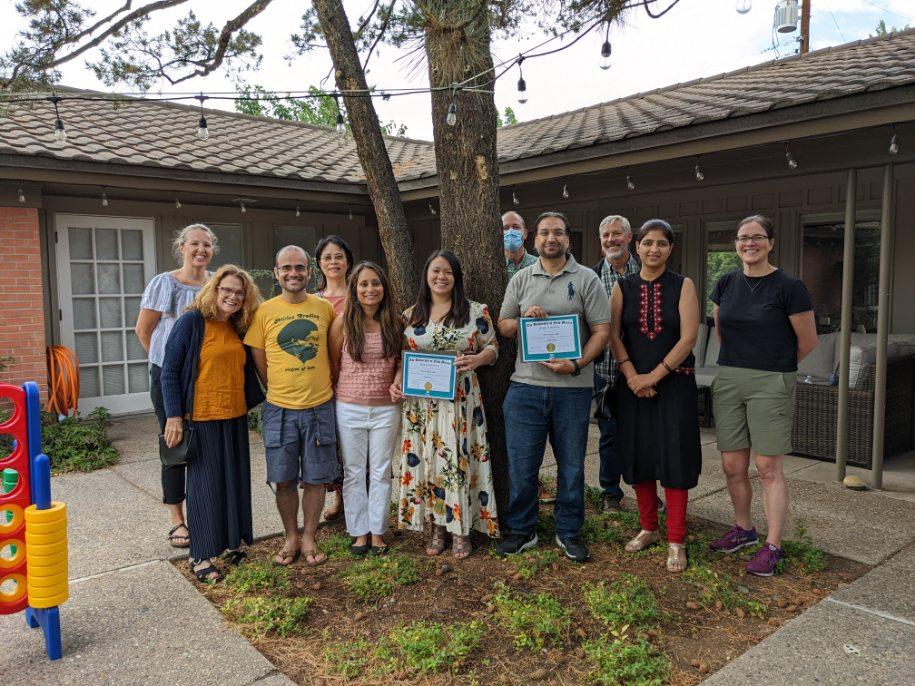
2022 fellow graduation party.
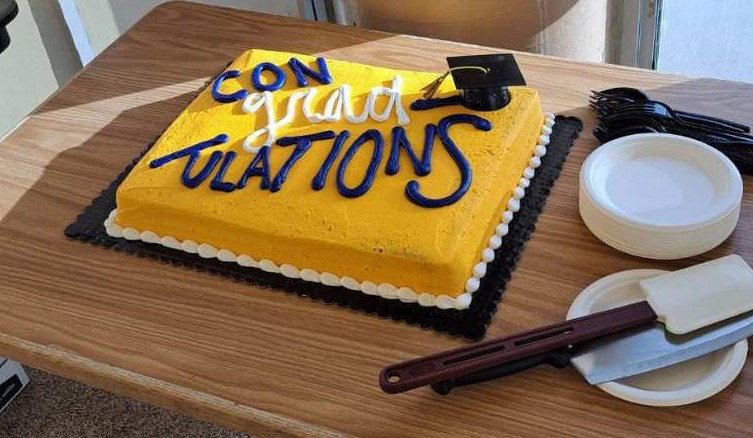
2023 fellow graduation party.
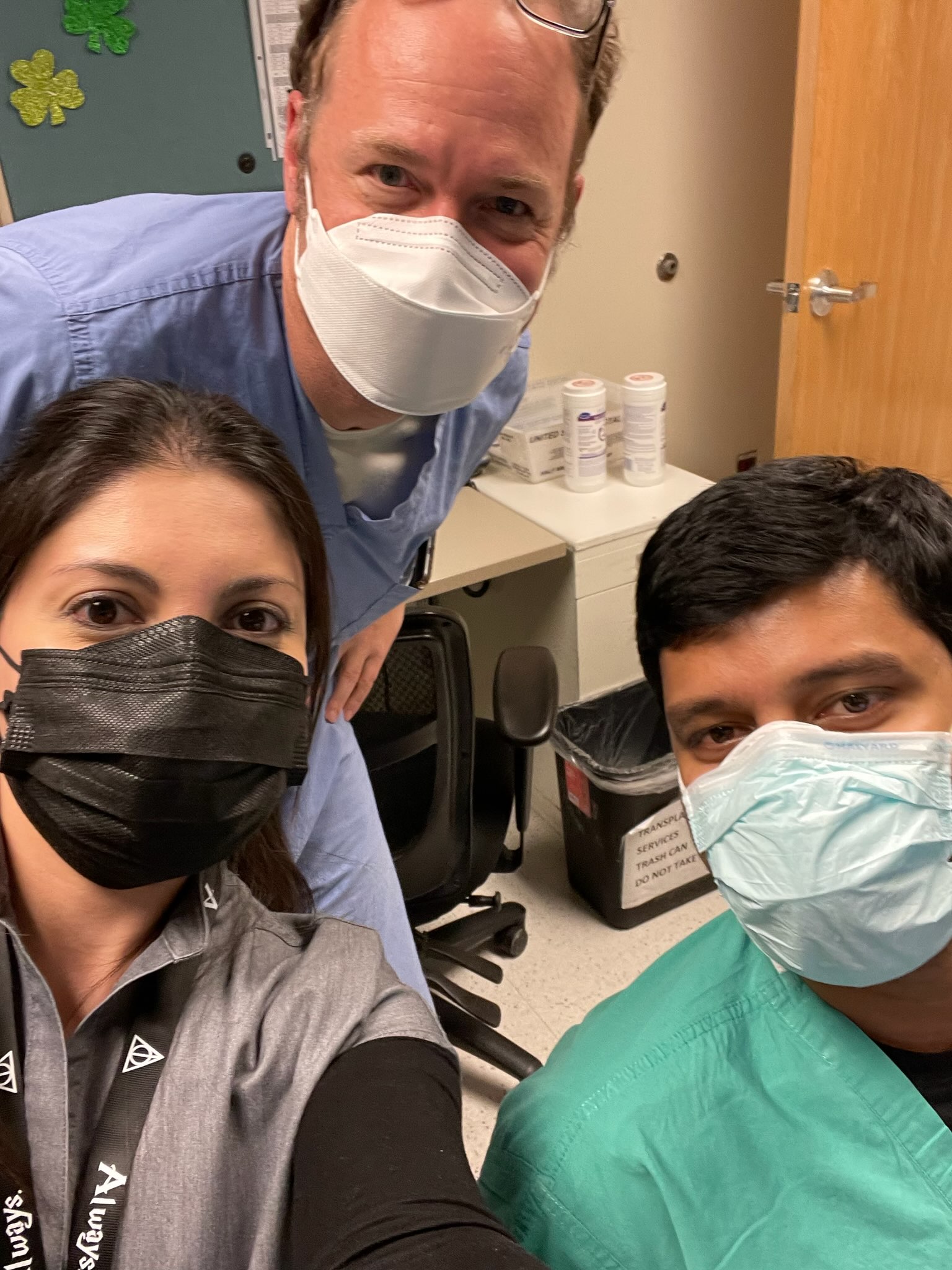
Fellows Dr. Pamela Vasquez (class of 2022) and Dr. Chandra Kodavanti (class of 2023) with clinic director Dr. Darren Schmidt at UNMH General Nephrology Clinic.
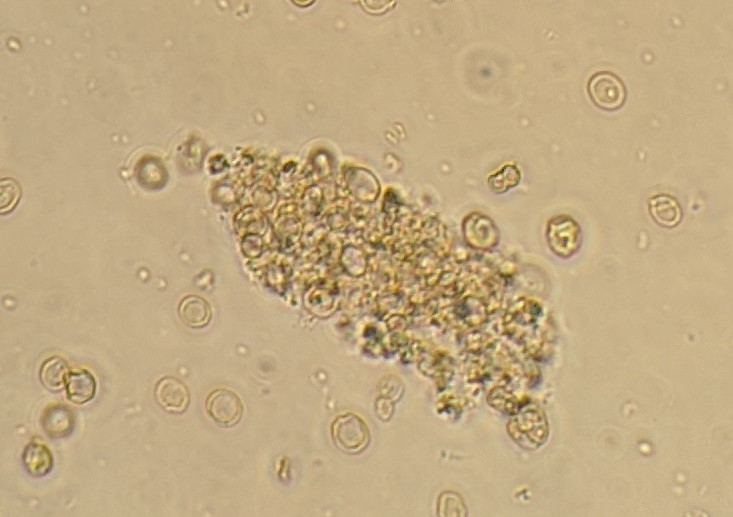
RBC cast found in urine microscopy of patient with rapidly progressive GN diagnosed at UNMH. (Shared with permission.)
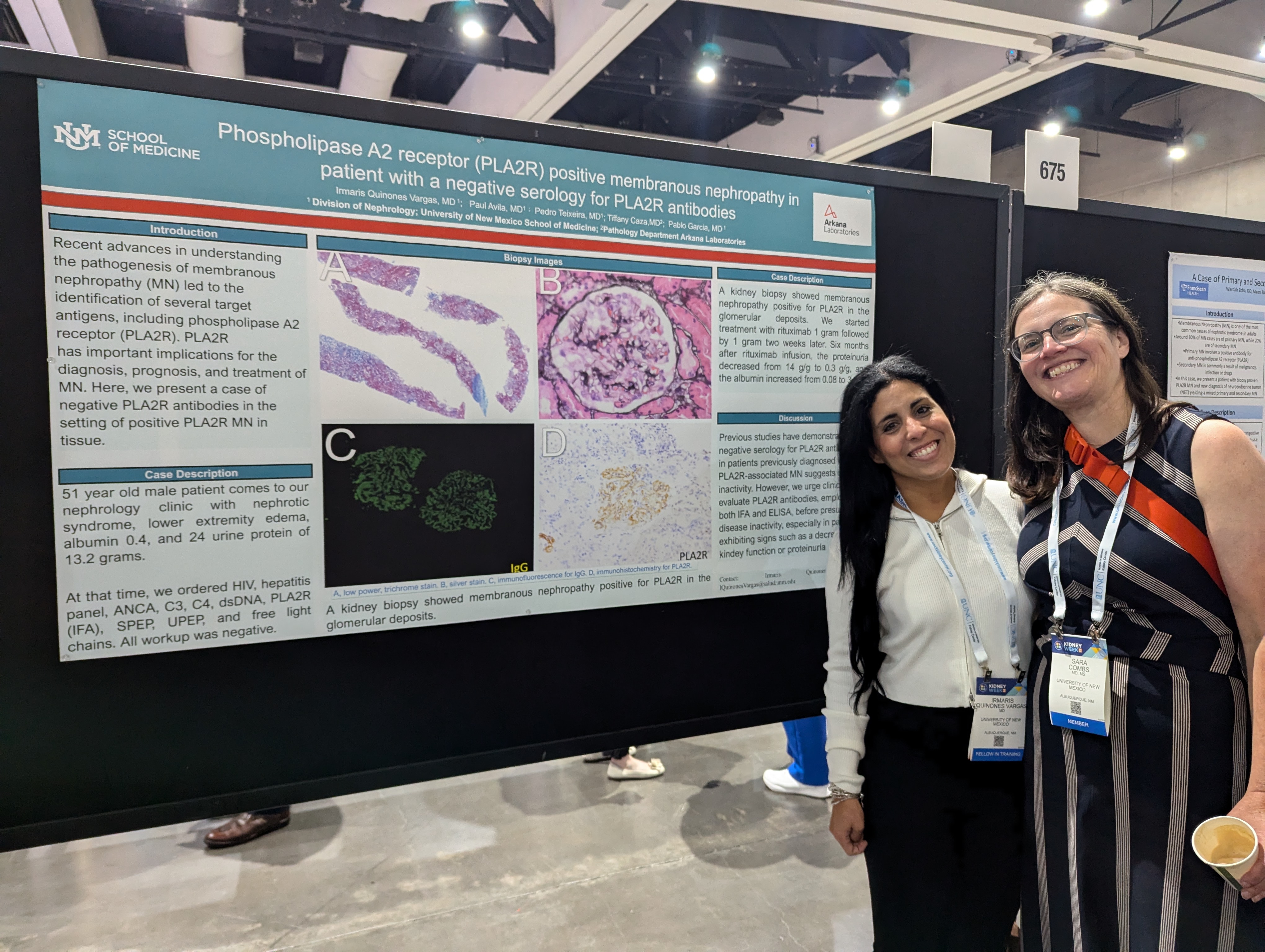
Fellow Dr. Irmaris Quinones Vargas (left, class of 2025) presenting her case report abstract alongside faculty member Dr. Sara Combs at 2025 ASN Kidney Week Conference in San Diego.
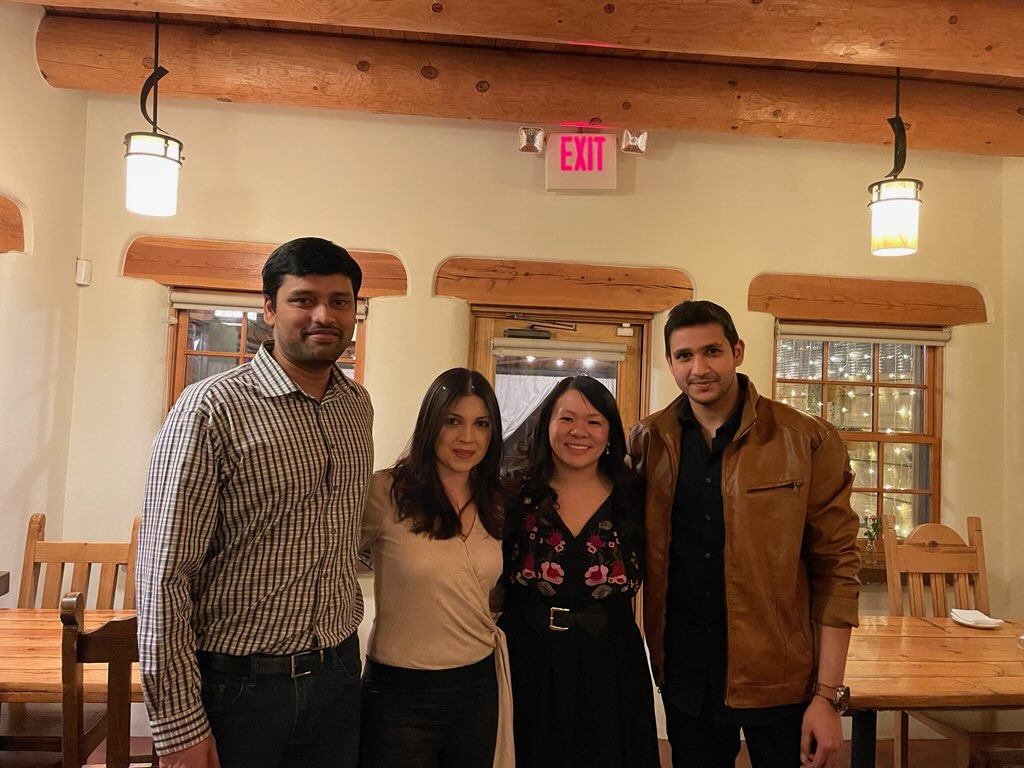
Fellows Chandra Kodavanti (class of 2023), Pamela Vasquez (class of 2022), Michelle Shieh (class of 2023), and Anil Pal (class of 2023) at dinner in Albuquerque.
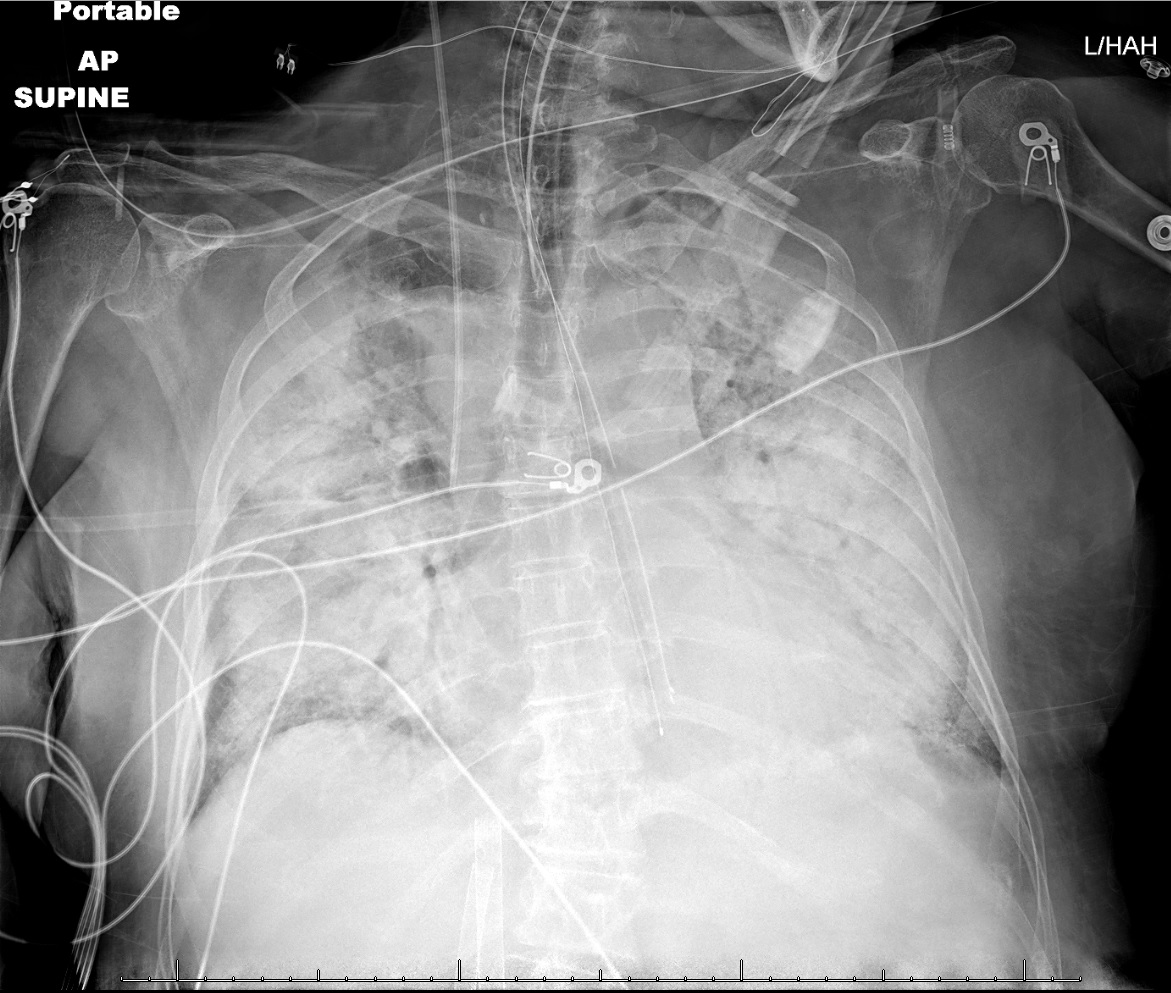
Chest x-ray of patient requiring VV-ECMO and CRRT for pulmonary-renal syndrome from ANCA vasculitis treated by UNM nephrology consult service with cyclophosphamide with eventual full recovery. (Shared with permission.)
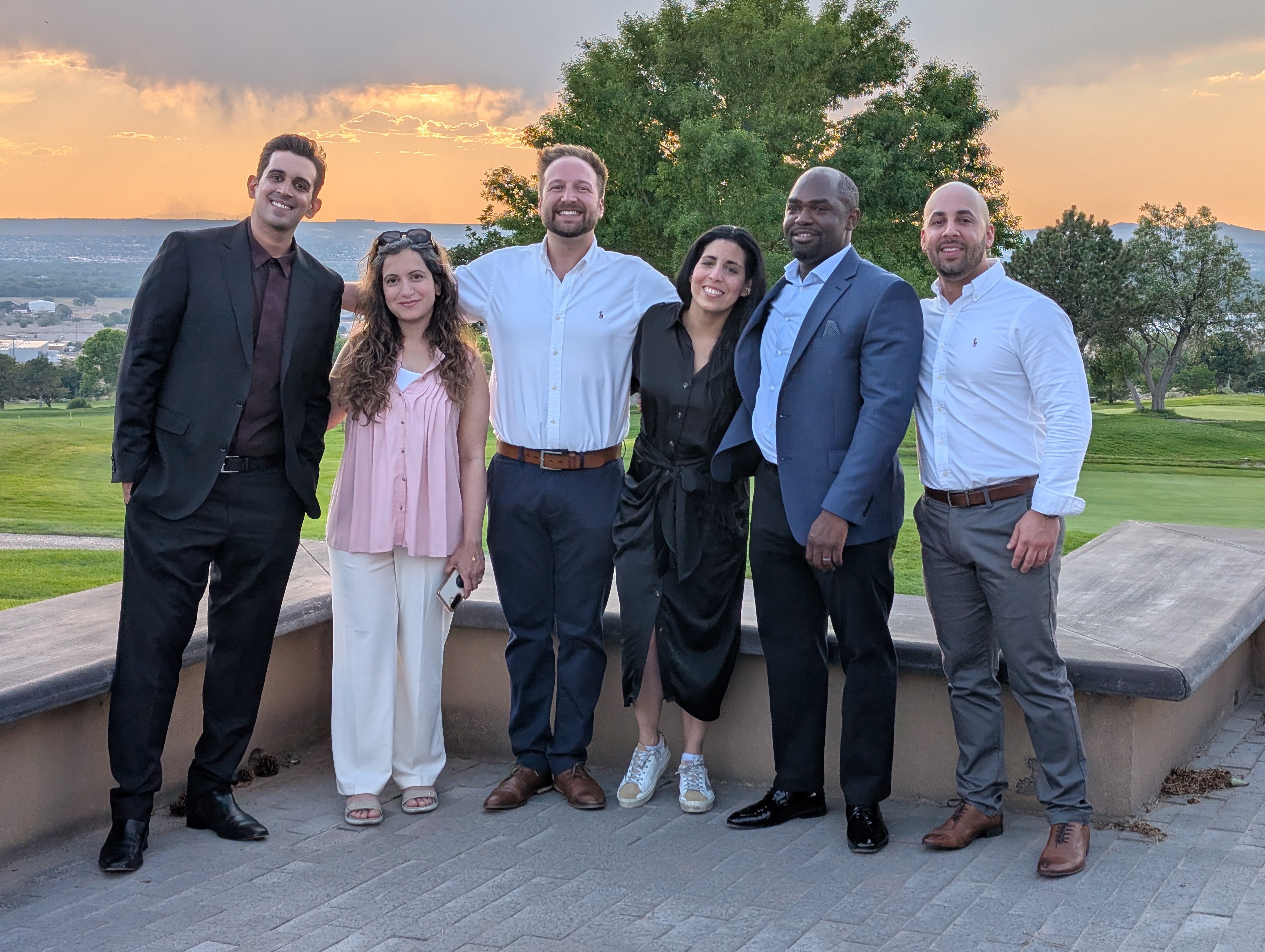
Fellows (left to right) Rajeev Seecheran (class of 2026), Nimra Iftikhar (class of 2026), AJ Moghaddam (class of 2025), Irmaris Quinones Vargas (class of 2025), Kingsley Onuoha (class of 2025), and Luis Madera Marin (class of 2025) at 2025 fellow graduation party.
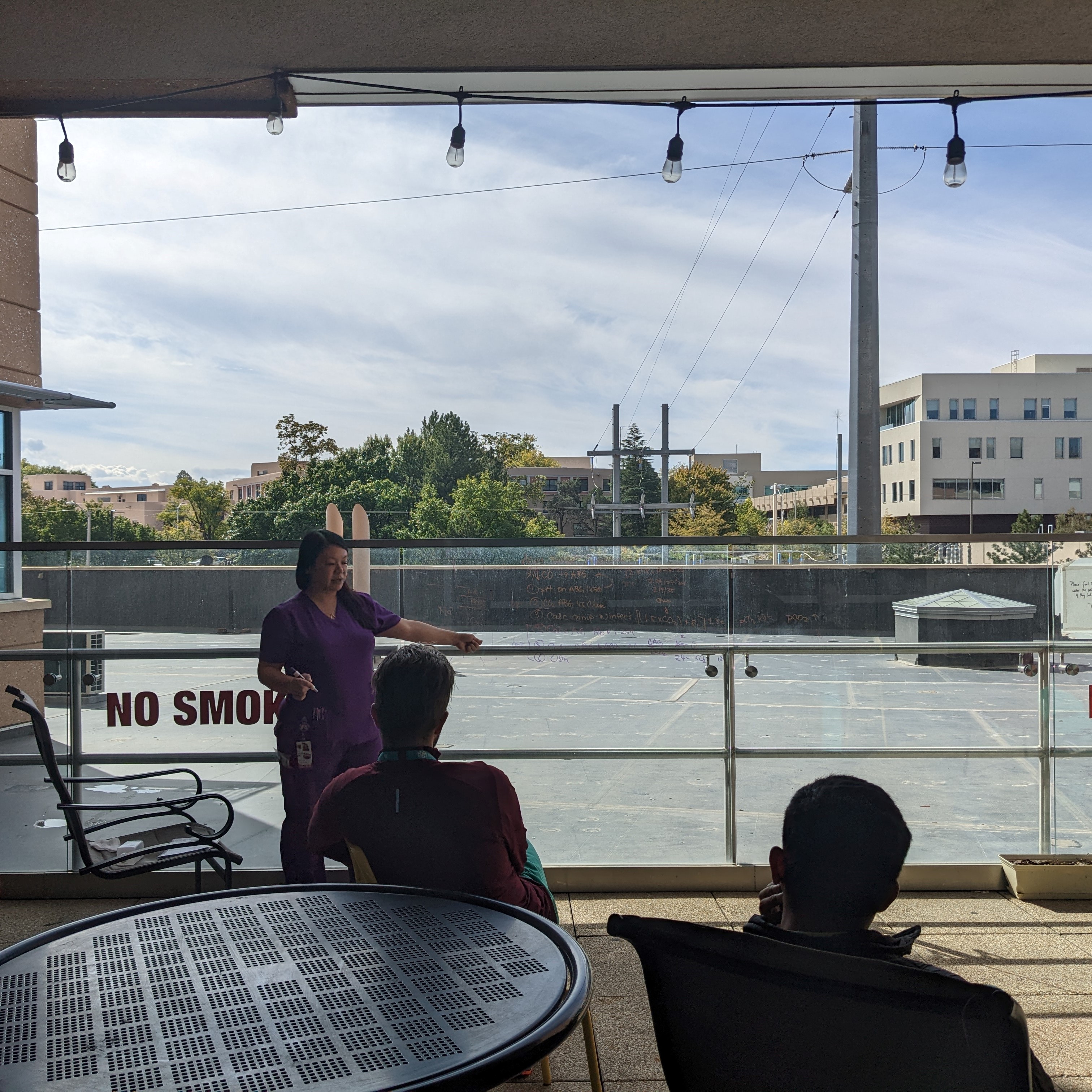
Dr. Michelle Shieh (Nephrology-Critical Care, class of 2023) teaches students and residents her approach to acid-base status in the patio outside the UNMH adult ICUs.
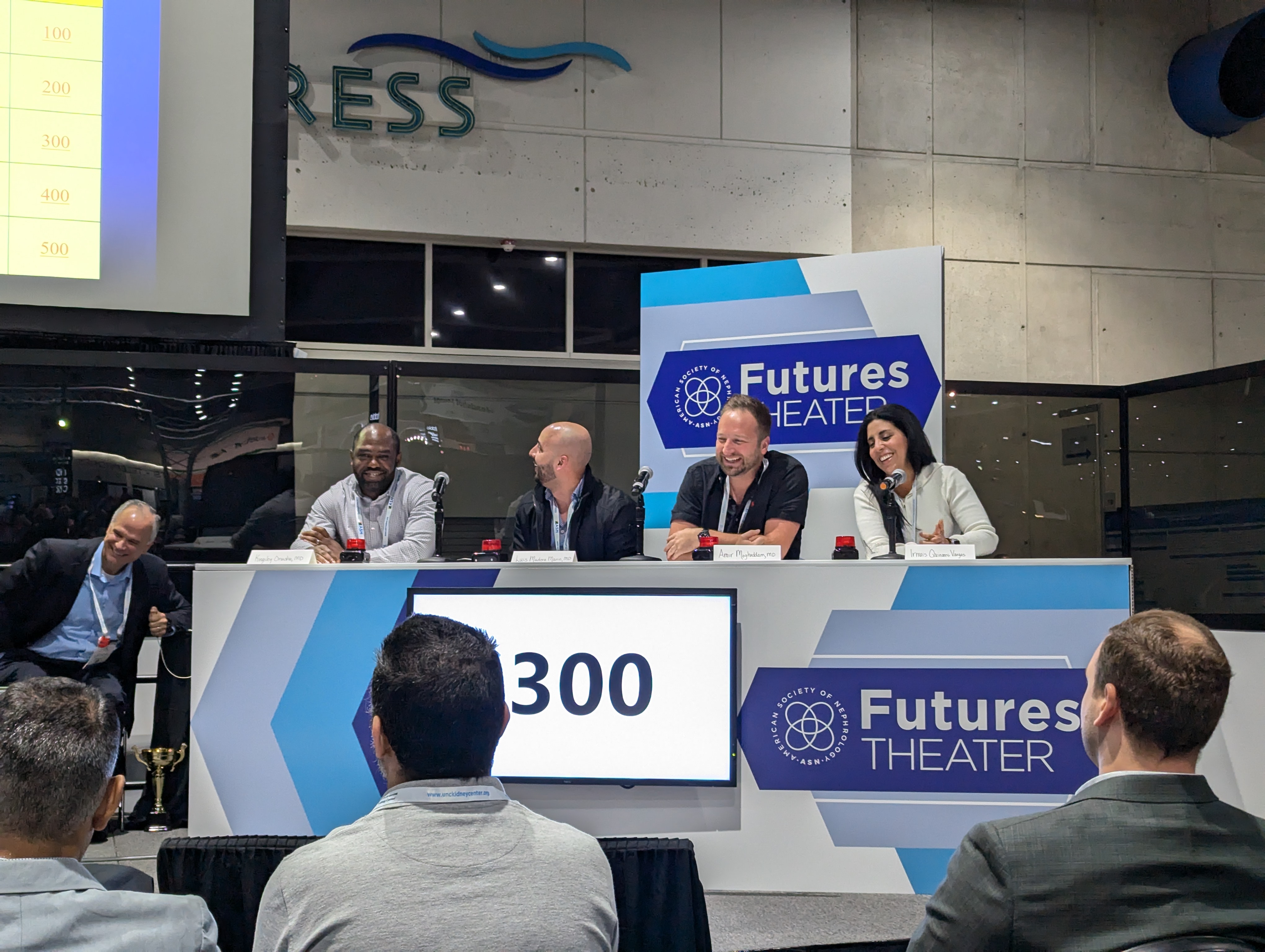
Fellows (left to right) Kingsley Onuoha, Luis Madera Marin, AJ Moghaddam, and Irmaris Quinones Vargas (all class of 2025) compete against other fellowship programs in the Fellows-in-Training Bowl at the 2024 ASN Kidney Week conference in San Diego.
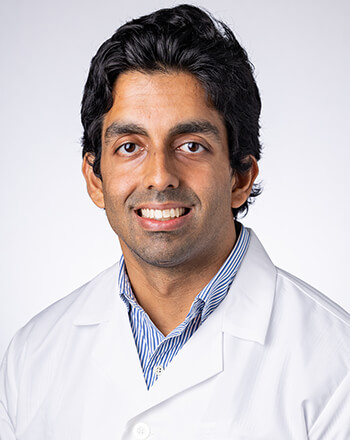
He consistently goes above and beyond to ensure the success of his fellows in achieving their goals. Despite his demanding schedule, he willingly carves out time to impart his knowledge on a range of subjects. In fact, his dedication to my personal success is so profound that it rivals the unwavering concern of my own mother.
Department of Internal Medicine
UNM School of Medicine
MSC04 2785 1 University of New Mexico